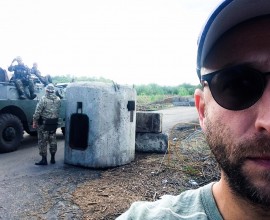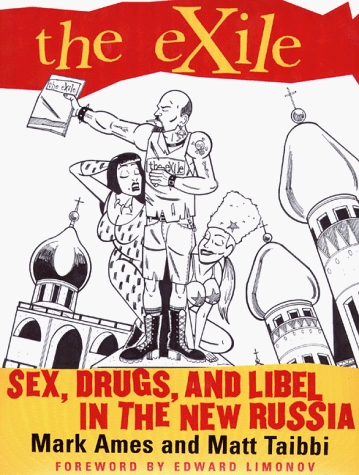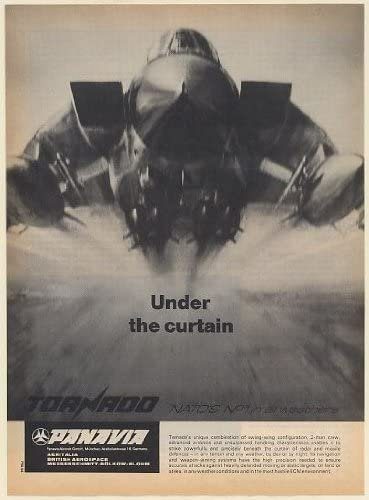
This was first published as a Radio War Nerd subscriber newsletter on May 7, 2022.
NATO’s been around for longer than I have. It survived what should have been its extinction event, the fall of the Soviet Union. In fact, it expanded and became more aggressive once the USSR, its supposed enemy, vanished. NATO’s own site mentions an odd factoid: Its first military operation came, not in the Cold War years, but in 1991.
That’s odd, right? If you’re old enough to remember the Cold War, like me, you took it for granted that defending Europe from the Soviet threat was NATO’s whole purpose, its reason for existing. Western Europe was at the mercy of Soviet tanks, and the NATO forces were the only thing keeping them from rolling in. Thousands of Russian tanks were “poised” — the newspapers always used that word, “poised” — to pour through the Fulda Gap.
Most of us were pretty vague about what the Fulda Gap was and couldn’t have found it on a map — people couldn’t google things in those days, and it was a lot harder to go to the library, grab one of those giant Atlases, and try to find Fulda on it — but we proto-War Nerds were proud of just knowing the term, “Fulda Gap.”
That put us way ahead of the ordinary rubes who uncomplainingly paid their taxes for the expensive weapons NATO stacked up in what was then West Germany, and to show off, we talked a great deal about that Fulda Gap. It was our favorite gap, over there somewhere in the clogged, incomprehensible, history-littered mess of Central Europe. We were very worried about it. It was vulnerable.
Here’s the actual gap, if you’re interested:
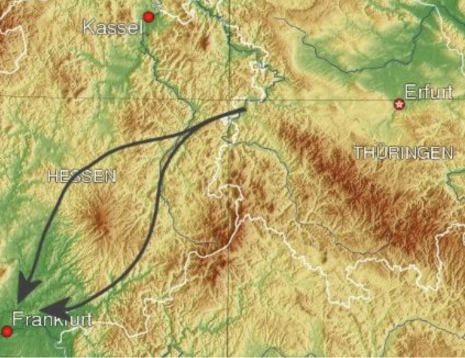 The Fulda Gap, a mythical realm of the NATO Era.
The Fulda Gap, a mythical realm of the NATO Era.
It’s not much, just a route around what passes for mountains over there. But it was vulnerable, that was the key. NATO was always vulnerable, like a silent-film heroine. Those Russian tanks were always on the verge of rolling over NATO like a steam locomotive chugging toward Mary Pickford, tied to the tracks.
But the Russian tanks never came. The rubes still paid for new, more expensive weapons meant to stop them. But they never came. Even when America was distracted, as in the Vietnam War, or during Watergate, they never came.
All through the whole second half of the last century, taxpayers coughed up for endless NATO upgrades and nobody in America questioned or complained about it. I seem to remember the actual Western Europeans complained sometimes, but what did they know? Europe seemed weak, drained of all its fire, gone from berserkers to appeasers in the wake of 1945. Why, those Dutch even let their army have a union!
The US was the bulwark of The Alleged West. And even in Europe, everyone who mattered supported NATO, as far as we knew.
Looking back now, it’s our acceptance of the whole farce that seems odd. You’d think people would catch on after a few decades, but we never did.
It was the old joke, the favorite joke of any protection racketeer: The fact that the tanks never poured through the Fulda Gap just proved how well the protection racket was working.
Any time a nay-sayer dared to suggest that the Russians might not even mean to send their tanks, they got slapped down with the same cliches: “Munich!” “1939!” “Readiness!” and “If you want peace, prepare for war.” That was a big one, that slogan. The less you know, the more sense it makes, and we didn’t know much.
Like I say, this was before the internet — and no matter how annoying the internet can be, you durn kidz just try imagining a world where the censors of the three TV networks and a half-dozen big-city newspapers ruled the entire spectrum of media discussion. Hold your thumb and index finger about a centimeter apart; that was the range of opinion.
And for those editors, it was always 1939. It’s still 1939, for mainstream people. Sure, there have been gigantic, horrific wars all over the world since then, but those wars were in the Global South, the hot countries, and they mostly killed poor, non-European people, who just don’t count for the pundits.
If you think I’m exaggerating, just compare the orgy of commiseration about war in Ukraine with the pundits’ studied silence about Yemen or Tigray. It’s so blatant, so obvious, and so gross that there’s no use even beating them over the head with it. I’ve tried, and it’s like sermonizing your cat. They can’t change, and don’t even want to. They’re comfortable with 1939; it’s the only navigation aid they know, their one lighthouse in a dark world.
Khomeini said, “Every day is Ashura and every land is Karbala.” Well, for a NATO-shilling pundit, and they were legion, every day was the Munich Conference, every dissent was “appeasement,” and the only danger was not pouring trillions into weapons that would never be used.
And this strange tableau never changed, even as other things were morphing wildly. That’s what amazes me, looking back: the sheer granite stability of the NATO scam. You could call it a tableau vivant, but you’d have to leave off the vivant part. That Russian blitzkrieg never came, but it was always going to come.
Being an American in the Cold War was a lot like belonging to one of those Last Days churches, where you sit through a scary sermon every Sunday about how The Lord is coming soon, very soon, all too soon, and YOU PEOPLE AREN’T READY! YOU WILL BE CONSUMED IN FIRE!
Come to think of it, I wonder if 40 years of believing in those Russian tanks swarming through the Fulda Gap had something to do with the rise of the Evangelicals. They must have found it easy to believe “The End is nigh! You will be consumed in fire!” In fact, that pretty much was the prediction: We would be consumed in fire, but secular, Soviet fire, tank fire.
And all it amounted to was money, the boring, adult stuff Cold-War kids like me never even thought about. Money didn’t seem very interesting in those years. The notion of worshipping billionaires was alien — that’s one thing I have to say, grudgingly, for that accursed era: They didn’t worship billionaires.
But the oligarchs of that era didn’t mind not being worshipped, as long as that sweet Defense money kept coming. Those budgets were as irrational in their details as in their basic premise.
That is to say, they were overwhelmingly invested in conventional, armored warfare tailored to the European battlefield. NATO strategists, and their colleagues (“colleagues” is very much the correct term) in the Warsaw Pact planned endlessly for a replay of the Eastern Front in WW 2.
There was one little flaw in this thinking: Nukes. There were no nukes on the Eastern Front in WW 2. If there had been, they would have been used. Like, instantly. By either side. Used until they were all used up, and Europe was a lake of glass.
So if the Eastern Front sequel, replayed with nukes in the inventory, would inevitably go nuclear, then what was the point of all those troops with rifles, all those tanks?
You’d do just as well — and save a few trillion — by stationing a few thousand unarmed soldiers with radios along the border between East and West Germany. If the Russian tanks crossed the border, the soldier with the radio could call it in, and the ICBMs would fly.
But NATO did not want to think much about that. Nukes were oddly unpopular among post-1945 officer corps. They were a form of automation that the officers’ guild did not favor. They would put all the armored divisions out of business, all the infantry divisions, all the surface navies.
Whereas an updated Eastern Front would mean full employment for the whole guild. And the best part was, you didn’t — you never would, in fact — have to make actual war. You would train endlessly for an event that you and your guild colleagues knew in your secret hearts would never happen.
Because they knew it would go nuclear and nobody wanted that. The big armies in NATO did plan for nuclear war, but glumly, in secret, with none of the zest for publicity they displayed when discussing conventional weapons that could be used against that “sea of tanks” the Russians were always about to send.
Nuclear war was like that line in Ghostbusters:
Bystander, staring up at the sky: “It’s a sign!”
Ghostbusters secretary: “It’s a sign all right, ‘Goin’ out of business!’”
The dream of this perfect, imagined NATO/Warsaw Pact conventional war was so precious that people had to invent scenarios which confronted and defused the nuke problem.
Somehow, the future war had to be conventional. But it had to deal with the existence of nuclear weapons. So storytellers came up with plotlines in which nuclear weapons were used, then abandoned. It had to be mano a mano, with good old tanks, planes and small arms.
So in the 1980s we got plotlines in which nukes were used only once or a few times, then abandoned in favor of conventional weapons. Sir John Hackett, a “respected” British general, published The Third World War: The Untold Story in 1982.
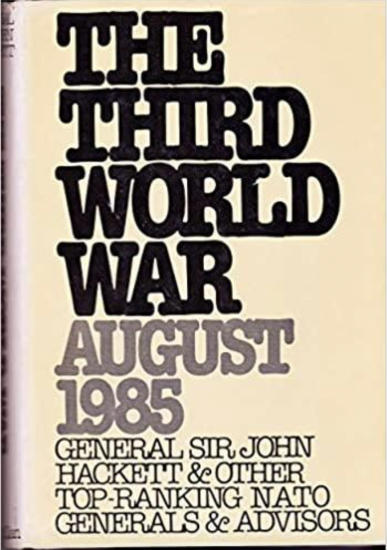
Hackett clearly savored every battle in his imagined war, except the nuke part. He didn’t look forward to that at all.
So he came up with a storyline that made all his readers happy: Early in the big NATO/WP war, the Soviets nuke a British city, and the Brits respond by nuking a Soviet city. And that’s the end of the nuclear war. After that, both sides stick to good ol’ tank/air warfare.
The genius of Hackett’s plot is the choice of city. It’s a Tale of Two Cities nobody who mattered would miss. So, in his book, the Soviets nuke…Birmingham. Perfect! Nobody Hackett was likely to meet at the MoD or over drinks at the club would miss Birmingham! In fact, they’d wax droll over it, little jokes about how they’d have paid the Russians to take care of Birmingham for them, etc.
And in retaliation, Hackett’s plot has NATO nuking…Minsk. Not to bad-mouth Minsk, but…it’s Minsk, OK? Nobody in the Kremlin would miss Minsk. So, after exchanging pawns, NATO and the Warsaw Pact get down to business, in Hackett’s book, blasting each other with updated WW2 weapons.
There’s something similar in the original Red Dawn (1984), the movie that defined Reagan-era Cold-War dreams.
In the movie, Powers Boothe plays a shot-down F-15 pilot (“I’m an Eagle jockey,” he introduces himself) who parachutes into occupied Colorado and is rescued by the Wolverines, a teen clique of American insurgents. First, Boothe has to justify getting shot down (because Patrick Swayze and his fighters are pretty hardcore, believe you me), which he does by invoking the common view that the Russians had more of everything, including fighter planes. Boothe growls, “There was four of’em. I GOT three!”
After that the Wolverines accept him as an OK fighter and ask him to explain the big war picture to them. Boothe lays it out, his face smeared with expensive “battle-smoke” camouflage, using a stick as they stare into their campfire in the Rockies.
Boothe’s summary has it all, from illegal immigrants who are actually Soviet infiltrators, to a craven Europe which has decided to “sit this one out…all except England, and they won’t last very long.”
Then he adds another commonplace used to explain why the war didn’t go all-out nuclear: “The Russians need to take us in one piece, and that’s why they won’t use nukes, and we won’t either, not on our own soil…the whole thing’s pretty conventional now.”
Every now and then, some troublemaker would break the taboo and ask the old, annoying question, “But wouldn’t an all-out war between NATO and the Warsaw Pact go nuclear?”
That quibble was mostly ignored by the newspapers of record, the television networks, the talk shows. We dreamed of nuclear war, but in an oddly detached way, imagining our cities vanished under the mushroom cloud. It wasn’t a battlefield, and it didn’t have much to do with how we imagined a replay of WW 2 in Europe. It could happen for any reason, our president having a tantrum, the Soviet boss waking up on the wrong side of the bed, anything. We didn’t connect it with trillions spent on NATO, or the 400,000-odd US troops we kept in Europe, along the West Germany vs. East Germany line.
And there was a funny thing about those H-Bomb dreams: They were a feature of the first phase of the Cold War, the 1950s and early 1960s, much more than the second Cold War, under Reagan. Reagan’s Cold War was tilted toward conventional war, while that first phase was dominated by the possibility of a sudden, unpredictable, all-out nuclear exchange.
There’s a Peanuts strip, from about a year before I was born, showing how sudden and nuclear people imagined war in the first phase:
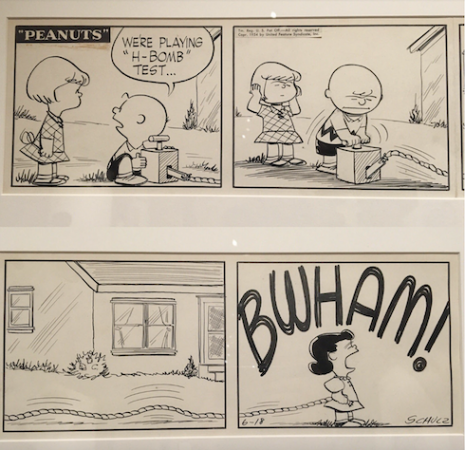 Peanuts 1954. This was totally first-phase dreaming, not at all like Reagan-era dreaming.
Peanuts 1954. This was totally first-phase dreaming, not at all like Reagan-era dreaming.
There was a logical problem with US action during this first phase: Everyone thought that the war would be sudden and nuclear, with no role for old-timey soldiers with guns. But at the same time, the US maintained almost half a million soldiers with guns, tanks — the whole outmoded WW 2 arsenal — in Western Europe. So what were they doing, the 400,000 American troops in Europe?
There weren’t enough of them to stop a Soviet blitzkrieg, but there were about 390,000 too many to be pure “tripwire” soldiers. “Tripwire” was a common way to describe them, meaning their job was to get rolled over and call it in.
It’s so strange to remember that now, the “tripwire” talk that pundits used so blandly. That’s something I keep coming back to when I try to remember that dim time, dim in more ways than one: Didn’t they think harder? Didn’t it cross their minds that their strategy was hopelessly confused?
400k soldiers was too many for a tripwire, too few for a deterrent, but we accepted them. I wonder now if that was because we knew it was all theater. I think people did begin to think that, as the years went by with no big war.
Maybe when NATO started in 1949, Americans really expected a big WW3 to flare up in Central Europe, as if the embers of WW2 hadn’t been fully hosed down. But by the 1970s, the idea that the Russians were eternally revving their engines, waiting to hit that Fulda Gap, was a little far-fetched.
Cool people made fun of army guys (Animal House) and saw “the service” as a last resort of the unemployable. It was not cool at all. Brezhnev was running the USSR, and all it took was one look at his photos to see that this guy’s whole ambition was to die in his bed, as comfortably as possible. He didn’t make a plausible war chief.
 Brezhnev: “Just let me die in peace, OK?”
Brezhnev: “Just let me die in peace, OK?”
Only a few specialists thought hard about what those big NATO armies were doing. Most Americans accepted NATO as a form of insurance. You might not need it, but you should always have it, and that means paying the premiums every year.
The premiums were the gigantic Department of Defense budgets Congress voted every year. After all, the way we saw it, NATO really amounted to the United States with a few lesser, much lesser, sidemen. And we made the rules, as shown by the rule about withdrawing:
“…any Party may cease to be a Party one year after its notice of denunciation has been given to the Government of the United States of America, which will inform the Governments of the other Parties of the deposit of each notice of denunciation.
Like a tough landlord, we insisted on a year’s notice. And even when our European allies followed the rules, the U.S. vilified them.
When de Gaulle tried to downscale France’s integration in NATO in 1966 (because he had this quaint notion that France was a sovereign power), he became an enemy forever. I remember the editorial cartoons, the furious opinion pieces, and the scornful reminders of France’s supposedly cowardly record in WW2 after de Gaulle tried to pull France back.
It was obvious, it went without saying, that if NATO showed weakness in any way, those Russian tanks would roll west til they hit the Atlantic Ocean. And maybe they wouldn’t stop there, either. First they take Paris, then they take Manhattan, as Leonard Cohen didn’t say.
De Gaulle’s pride in the French nuclear force may have been odd, by superpower standards. The French (and British) nuclear forces were nothing compared to the Soviet or American stockpiles. In 1977 Britain had 500 nuclear warheads, France about 230, enough to level most major Soviet cities. That seemed small compared to the five-figure totals of America and the USSR.
Those two nuclear forces were something else, unprecedented. The ability to end the planet! There was something hysterical about it, even exciting. I always wondered why no one spoke in favor of nuclear war, but I didn’t say that out loud. You were supposed to be anti-them; even I knew that. Kept it to myself, how beautiful those mushroom clouds were, how right they felt, how deserved.
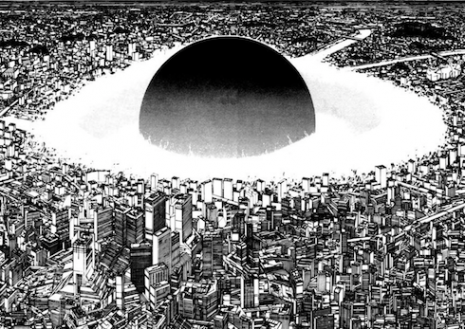 A still from Akira (1988), in which you get not one but two nuclear annihilations, both beautiful. It’s always fun when 21st c. academics go “Heeeey, there’s jouissance going on with those mushroom clouds!” As my compatriots in Cold-War Pleasant Hill were wont to say, “No shit, Sherlock Ph.D.!”
A still from Akira (1988), in which you get not one but two nuclear annihilations, both beautiful. It’s always fun when 21st c. academics go “Heeeey, there’s jouissance going on with those mushroom clouds!” As my compatriots in Cold-War Pleasant Hill were wont to say, “No shit, Sherlock Ph.D.!”
This made for some awkward conversations with Mark and Steve Shumway, children of a liberal Minnesota family across the street. They would go to their heretical church and get all anxious about nuclear war. It seemed a bit shameful to me, though I tried to be broadminded.
There were lots of jokes about the crazy overkill of those stockpiled nukes, but the people making the jokes were a few fringe comics and lefties, and even they tended to moan about nuclear war as if it was bad weather, something sad that wasn’t anyone’s particular fault. That dog sitting in the flames smiling? Very Cold-War, only the flames were in the future tense. It was an awful lot like thinking about Hell: it would be bad if it happened, but you couldn’t help giggling about it, all those flames.
In fact, a lot of us, I think, felt the pull of oblivion. When I heard Tom Lehrer’s supposedly anti-nuke song, “We’ll All Go Together When We Go,” I heard it as a dream of justice, not a warning.
Every other war killed some people, often the best of their world, and left others, often the worst, alive and gloating. Wasn’t it better, a war where “we’d all go together”
Maybe that was an eccentric reading, but I don’t think, looking back, that I was all that eccentric. Just “outside the permitted discourse,” as they said in grad school. We were legion, the oblivion fans.
There was no real argument in the media about any of this grotesque tableau. In fact, there was very, very little argument in the American media about anything beyond preference for one or the other presidential candidates. I’m telling you, those gatekeepers ruled the world before the internet came along.
The US media lost interest in NATO a bit in the worst years of the Vietnam War, from about 1968-1973. By the time Nixon resigned, the US central government was adrift and the Army was a demoralized branch of the Civil Service.
You had to wonder — well, I had to wonder anyway, in my few lucid moments, why the USSR didn’t attack during Watergate, or in the chaos afterward, when a comically feeble Gerald Ford was fronting the Presidency for the deposed Nixon. The Russians could have won a conventional war easily at that time. They must have known it. Why, I wondered while picking my various scabs, didn’t they send the tanks across that famous Fulda Gap?
That got me wondering why they hadn’t struck after JFK got killed, in November 1963. You wouldn’t believe how that assassination pole-axed America. Hell, even Lou Reed wrote a maudlin song about it. People were paralyzed. And there were constant rumors that the Soviets had killed JFK, either by themselves or via their Cuban proxies.
Looking back, it’s pretty obvious why not. First of all, the Soviets didn’t want to. They were much more afraid of war than America, which had never been invaded. The Soviet elite of that era wanted a little calm, the chance to have a moderately prosperous life. That’s what they’d always wanted: no incursions, leave us alone. No one had taken that World Revolution noise seriously for decades.
Second, they knew what would happen if they did send the tanks across the West German border. The US would nuke every city and military base in the USSR. Of course the USSR would return the favor, nuking every American city and military base, but that wasn’t much comfort.
In other words, only amateurs took those big conventional armies in Europe seriously. What mattered was the nukes. It was that simple.
Which raises the question, what the Hell were those huge, expensive armies all about? Even if you could suspend your disbelief in a purely conventional war, it was impossible to explain how those NATO armies were supposed to survive a long, grinding Eastern Front war. It didn’t seem likely that they could be reinforced from America if an all-out war started.
Even the Nazis had come very close to cutting off trans-Atlantic shipping with no more than a few diesel submarines, and the Soviets were a lot bigger and smarter than the wretched Nazis. The Soviets had magnificent interceptor aircraft (or so we were told) and were always “building” a great navy. How was the US supposed to reinforce its troops in Central Europe across an ocean full of Soviet subs and within range of Soviet interceptors?
There were Popular Mechanix stories that “we” planned to commandeer commercial airliners and use them to ferry G.I.s across the ocean. But even for a trusting Cold War product like me, those stories seemed absurd. They were going to ferry tanks and APCs across the Atlantic, in wartime, on a bunch of re-branded 747s? Those big giant radar-signature planes, in range of the fearsome Soviet fighter-bombers?
Much as I wanted to believe, I couldn’t help thinking, “I don’t think I’d want to be on one of those planes.”
Yet even NATO’s most obvious weaknesses led to bigger budgets because there was always some gadget under development that would fix them. STOL cargo planes would allow NATO to use highways and small airfields, more fighter aircraft would be able protect convoys of cargo planes and so on.
There was always a gadget on the way that would save us. Gadget wars were something we could win, unlike Vietnam, where no gadget, however loudly touted in Popular Mechanix, seemed to make any difference. Russians played war fair, with tanks and planes and a front, a proper front. Them you could beat with gadgets.
And the most feared Russian gadgets were new, secret, superpowered attack planes that could blast those converted 747s out of the sky, like the MiG-25. You would not believe the volume of terrified, awed, enraptured prose about that plane which flowed from the typewriter keyboards of thousands of NATO shills. Hell, Clint Eastwood made a movie about it. That’s how much we all loved to fear it.
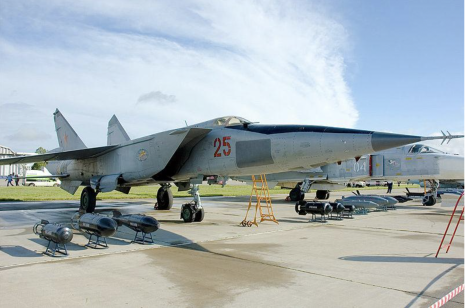 The MiG-25, NATO codename “Foxbat” though it turned out to be more of a stripped-down 1970s muscle car.
The MiG-25, NATO codename “Foxbat” though it turned out to be more of a stripped-down 1970s muscle car.
Well, a Russian pilot flew his Foxbat to Japan in 1976, and the techies swarmed over that plane. What they found — though they didn’t publicize it much — was that the MiG-25 was a stripped-down, low-rent muscle car of a fighter. Its famous “Mach-3” speed required a long, slow acceleration; it was hand-welded of nickel-steel alloy, not titanium as claimed; its electronic systems used vacuum tubes, and its range was a crazy-low 300 km/190 mi.
It was essentially a short-range interceptor, useful for attacking bombers or short-range recon, but not much else.
The news that the MiG-25 wasn’t as scary as we’d been told didn’t get out nearly as fast as the claims about its super-powers had. There was no profit in downplaying Soviet threats.
As far back as the “Bomber Gap” and “Missile Gap,” Cold War media told the scare stories loud and clear, but consigned the corrections to page 17. So us rubes had an inflated notion of the USSR’s power, right up until it went out of business.
We had our own champions, like the F-15, marketed as an answer to the “growing” Soviet AF threat.
 The F-15 Eagle: Always outnumbered in our dreams
The F-15 Eagle: Always outnumbered in our dreams
It was a good plane (and a very expensive one) but we had so few of them! We always needed more.
There was always that sense that the USSR had more of everything, as in Powers Boothe’s account of his unequal combat against the MiG’s. More tanks, more fighter planes, and more will.
The part about more tanks may have been true, at certain points during the long phony war, but the rest was totally false. The Soviet AF never matched the USAF, and as for the will to fight…well, that myth lasted right up to the moment the USSR fizzled out like a damp campfire. Just plain fizzled out without firing a shot. So much for their iron will, their endlessly growing threat, their terrifying potential.
The collapse of our designated villain was a shock. I mean across the board. A shock to Kremlinologists, a shock to the public, and a giant shock to weapons manufacturers. What’s St George supposed to do when his Dragon ups and dies?
Most of the people reading this will have grown up after that moment, so I should tell you, no one expected it. (Except Andrei Amalrik, and all he got for being right was an early death.)
We had a whole Hogwarts of Kremlinologists, whose job was to read the entrails and practice divination from them. Seriously, there were thousands of these charlatans pulling down tenured salaries in every respectable university in the NATO countries — and not one of them noticed that their subject, their very raisin deter, was about to fold. If they’d been employed by more rigorous institutions — say an actual wizards’ college in some fantasy novel — they’d have paid for their staggering incompetence with a slow and unpleasant death.
They didn’t, of course. They didn’t even get fired. That’s what it was to be part of the NATO industry: You did your part in the charade and got paid for that. Being competent had very little to do with it.
So when the Soviet Union turned off the lights and posted “Closed—Under New Management” in 1990-93, these Kremlinologists did what the Department of Defense and its contractors did: They changed the phrasing of their budget demands and scholarly articles from “Soviet threat” to “Russian threat.”
Thank God the USSR collapsed in the 1990s, because there were word processors by that time, so these people didn’t even have to risk RSI by retyping whole pages. “Soviet” became “Russian,” and they were back in business.
You might be wondering if there was any blushing, any apologies, from the Kremlinologist wizards’ guild. Then again, you might know better. Of course there wasn’t.
Reagan’s administration had so tamed the supposedly unpatriotic and liberal media that they never even called out all the Kremlinologists. I’d see some of them coming out of Barrows Hall, UC Berkeley, home of the Poli Sci Department (and in the running for ugliest building on campus, no small feat at a school which experienced a building boom during the 1960’s). Most were smug wretches like Steven Fish, later famed for trying to smear Stephen Cohen.
And I’d wonder even then, seeing people like Fish striding confidently along in their utter failure, almost with awe, at the mysterious workings of the God of Tenure. I’d think, “God, if all the marine biologists hadn’t noticed that the oceans were about to vanish, they wouldn’t be so smug!”
But the God of Tenure is a Calvinist, and his favors are distributed to many a Holy Willie.
And in a way, being distracted by envy of mere professors was typical of all of us victims of the great Cold War scam. We never even thought about the people who’d been collecting dividends, from Raytheon, Lockheed Martin, McDonell Douglas. That’s where NATO won its victory, in the dividend envelopes that arrived each month — do dividends arrive by month? I don’t really know. Hell, I never even got a tenure check.
All that was left was hazardous industrial waste. Those tanks, “a sea of rusting tanks” as one Soviet general mourned when it was all over; all those planes, whole deserts full of abandoned USAF deluxe models, all just part of the cost of doing business.
And the most bizarre part of NATO’s history, the footnote that was longer than the text itself, was yet to come: NATO’s many, many military operations after its precious Soviet Union had almost ruined things by unilaterally declaring peace.
Gary Brecher is the nom de guerre-nerd of John Dolan. Buy his book The War Nerd Iliad. Hear him read his comic memoir Pleasant Hell in audiobook format.
Subscribe to the Radio War Nerd podcast & newsletter!
This was first published as a Radio War Nerd subscriber newsletter on May 21, 2021. But with the total collapse of the US-backed Kabul regime, it’s even more relevant now to ask: What was the strategy?

Was there ever a plan there?
So what was supposed to happen back in October 2001, when the US forces invaded? I’ve been going through the papers of record, the NYT and WaPo, to see what the official line was, year by year. The first years of an occupation are the most important, so I’ve focused on the first five full years of US occupation, 2002-2007. You can find a good timeline of these years here, but it’s much harder to find any trace of a plan.
The US invaded both Afghanistan (October 2001) and Iraq (March 2003), but not all invasions are equal. For the DC elite, Iraq was a war of choice, while Afghanistan was just a grim preliminary chore. They had to invade Afghanistan quickly after the WTC attacks, because it was all over the news that Al Qaeda had its HQ there and the voters were angry. Public support for invading Afghanistan was higher than for invading Iraq.
But those in the know, in the three-letter agencies and the DC elite, knew Afghanistan was hopeless. They knew this because the Taliban, officially the enemy in Afghanistan, was sponsored and protected by the Pakistani armed forces. And Pakistan was never going to hand over Osama bin Laden or Mullah Omar, leader of the Taliban, to the Americans. The Pakistani intel elite, one of the scariest, murkiest groups in the world, cherished its pet jihadis as its one reliable weapon against the hated Indians. It was never going to help destroy them, or even cooperate in any serious pruning operation.
A decade after the US invaded with the supposed help of Pakistan, Osama was found in a big compound inside Pakistan, a few hundred meters from a Pakistani military. At that point even us rubes knew that the Pakistani government had never intended to betray its Taliban allies. (Note: “Taliban” here means the “Afghan Taliban,” as opposed to the later “Pakistani Taliban,” which the Pakistani gov’t, or at least some elements of that gov’t, really does dislike. Like I said, it’s murky.)
Nobody at the CIA or the 16 other US intel agencies really thought the Pakistani gov’t would give up their friends. And nobody in DC really thought that Afghans, as they imagined Afghans, would welcome American troops. So from the start, this was the poor stepchild invasion, while Iraq was coddled.
They had high hopes for Iraq. Iraqis, in the neocon dream, were really proto-Americans, just waiting for a Shock and Awe Apocalypse to free their inner Republican. Afghans, OTOH, were scary and alien. Brave, yes; remember all those Reagan-era movies on the glorious Afghan resistance?

Maybe too brave, in fact. The DC elite had heard that cliché about “Afghanistan, Graveyard of Empires” and believed it. Who wants to invade a dirt-poor country full of brave warriors who don’t seem like good candidates for transformation into suburban Americans?
The DC blob had no real hopes or plans for Afghanistan — and the stories from NYT and WaPo reflect that. These stories use several different models, which I’ll try to characterize here. They overlap, over the years 2002-2007, but they’re not in any strict chronological order. It’s more that those whose unlucky job it was to explain the invasion used whichever model retained a figleaf of plausibility at the time.
1. Revenge on a Budget
As Mark Ames said long ago, people in the US in the months after the WTC attacks acted as if the Martians had invaded. There was shock, rage, and an overpowering urge to whack somebody as soon and as hard as possible.
“Al Qaeda” and “Osama bin Laden” were the names given to this enemy, and “Afghanistan” was the place he’d hidden out to plan the attacks. So Afghanistan became a target. Not, at this stage, a project. It’s an important distinction. Iraq was always a project, but Afghanistan was just a target.
The New York Times’s series “A Nation Challenged” (2001/2) is typical of this first wave of Afghan stories. The challenged nation is America, and invading Afghanistan is just a part of America’s response to that challenge.
By making Afghanistan a “challenge,” the US played out its role as punitive invader.
Some people claim that was Osama’s plan all along: “Al Qaeda planned it that way! They knew the US would overreact and bankrupt itself in an endless ‘war on terror’!” Eeeh, I dunno. That’s how it played out, definitely, but TBH I don’t know if Al Qaeda’s leaders planned 9/11 that way or just wanted to hit the US as hard as possible. There was plenty of reason for Salafi Muslims to hate the US. Maybe they saw 9/11 as simple justice.
But if Osama hadn’t planned it, he was sure glad at the way it was turning out. In 2004 he gloated that he had managed to “bleed America into bankruptcy.” Someone in DoD circles should’ve taken that claim seriously. After all, Osama knew what he was talking about when it came to money. He came from big money and had done his bit in the Soviet Afghan War, which supposedly bankrupted the USSR.
The Afghan War was not, in fact, what doomed the USSR. But that cliché was almost universally believed, and with particular intensity in the DC Blob — so you might think US intel would at least have considered the possibility that this was Al Qaeda’s plan.
Here’s a typical story from the New York Times’ ‘Challenged’ series, October 8 2001:
“[Mr. Rumsfeld] said the goals of the military operation were to punish the Taliban for ‘harboring terrorists,’ to ‘acquire intelligence’ that will help future operations against Al Qaeda and to weaken the Taliban so severely that they will not be able to withstand an opposition assault.
“Another goal, Mr. Rumsfeld said, is to provide relief aid ‘to Afghans suffering truly oppressive living conditions under the Taliban regime.'”
Helping Afghans barely gets a mention, as “another goal.” That was a low priority at this stage.
You never get much sense of the Afghans themselves in these early stories. They’re a vague, hostile presence, an unknowable barbarian people. This was very different from the way Anglo media portrayed Iraqis, who were seen as lusting for democracy and commerce.
Like I said, Iraq was the real prize, Afghanistan was a chore that had to be done first. The reason was simple: Osama’s base (Qaeda) was in Afghanistan and every news consumer knew it. So the place had to be cleaned out, as quickly as possible, so the juggernaut could move on to Iraq.
This made for a quick, dirty, low-cost Rumsfeld plan for Afghanistan: lots of air strikes, low numbers of troops, mostly various “special forces” units, and little interest in the whole hearts-and-minds side of war. That was saved for Iraq. Afghans were supposed to get out of the way while the hunt for “terrorists” went on, mostly in the Pashtun southeast.

The initial campaign was very quick. One month after 9/11, the US and 40 reluctant allies started bombing.
It would be wrong to call this stage an occupation. Most of the countryside was untouched except by bombing raids. The rural patriarchy in the south, which was the Taliban, melted back into the villages after the fall of Mazar-i-Sharif. Some had been killed but even they had brothers and cousins who were happy to replace them when the time came. These guys were not typical Afghans, but then neither were the minorities and city folk who wanted change. And this first phase of the occupation did nothing to placate either part of the population.
The one cliché about Afghans we all knew was that “they hate foreigners.” Nobody asked Afghans about that generalization. And as it turned out, it was wrong.
Many Afghans were sick of the Taliban, who were mostly hick bigots, and were glad to see them overthrown. City people, educated women, and minority groups like the Hazara were especially happy to see the grimly enforced Pashtunwallah of the Taliban smashed, but even in some rural areas there was relief and hope that some money would flow in. As the NYTimes later wrote,
“The perception was that Afghans hated foreigners and that the Iraqis would welcome us,” said James Dobbins, the administration’s former special envoy for Afghanistan. “The reverse turned out to be the case.”’
Rumsfeld’s plan, heavy on air strikes and low on intelligence, wiped out that initial goodwill. “Air strike hits wedding party” became a standard headline, because from orbiting F-16s, a wedding can look a lot like an insurgent gathering. Or maybe any gathering was hostile by definition, in the years after 9/11/. The point was to hit somebody, never mind who.
A few reporters were recording the wedding attacks, but the light-and-quick strategy went on, and the “mistaken” air strikes with it.
2. Get ’er Done
No one in DC was worried about these mistakes. The point was to get Afghanistan done so they could move on to Iraq.
A year after invading, the NYT reported the fact that US troops just might have to stay a little longer as a surprise:
“October 13 2002
“A YEAR after the United States attacked Afghanistan, more than 9,000 American forces remain inside the country, hunting down remnants of Al Qaeda, building roads and schools, and struggling to adjust from a combat role to what looks more like a nation-building mission.
“Plenty of problems persist. Osama bin Laden, the Qaeda leader, may or may not still be alive, and Mullah Mohammed Omar, the former head of the Taliban, remains at large. Efforts to train a new multi-ethnic Afghan national army that would bolster the central government’s authority in lawless regions of the country have taken longer than expected. Regional warlords are feuding, posing new challenges to President Hamid Karzai’s government. Aid has been slow to reach many parts of the country.
“All this has led American commanders to acknowledge that United States troops will remain in Afghanistan at least another year and, more likely, much longer than that.”
The saddest thing about this paragraph is that it could be a 2020 story. “Much longer” turned out to be an understatement.
But back in 2002, the collateral killings were seen as blips, annoying but minor, in the Brain Trust’s big plan. By the spring of 2003, Rumsfeld announced that combat in Afghanistan was over:
“Mr. Rumsfeld said it had taken longer for a smaller force to root out elusive Qaeda terrorists than for the military to trounce the Iraqi armed forces, but he suggested that Afghanistan could be a laboratory for Iraqi reconstruction efforts. This is Mr. Rumsfeld’s third trip to Afghanistan since Sept. 11, 2001, and he praised the progress he had witnessed.”
3. Afghanistan is Like Kosovo, Sorta
Analogies, the dumber the better, were popular in these early days of the war. Michael Ignatieff, mercifully forgotten today, was a big name in those unlucky times. He had hope for Afghanistan under American occupation, based on its well-known similarities to…Bosnia. Yeah, that’s Afghanistan, the Bosnia of Central Asia. Here is Ignatieff writing in July, 2002:
“It will take years before the national government in Kabul accumulates enough revenue, international prestige and armed force to draw power away from the warlords. But Bosnia shows it can be done. Six years after the war, the Muslim, Croat and Serb armies are rusting away, the old warlords have gone into politics or business and a small national army of Bosnia is slowly coming into existence. The problem in Bosnia is corruption, and that is a better problem to have than war.”
This nonsense was taken seriously in part because Americans were hearing similar nonsense about Iraq. For example, Ken Adelman, who could give Doug Feith a running for “dumbest guy in the world,” actually wrote this in the pages of the Washington Post:
“I believe demolishing [Saddam] Hussein’s military power and liberating Iraq would be a cakewalk. Let me give simple, responsible reasons: (1) It was a cakewalk last time; (2) they’ve become much weaker; (3) we’ve become much stronger; and (4) now we’re playing for keeps.”
Hear the playground woofing, “now we’re playing for keeps”? That stuff was how America’s elite talked in the Millennial ear. You almost expect little Ken to add the slogan from Jaws 4: The Revenge — “This time it’s personal.”
As the US was gearing up for the 2003 invasion of Iraq, the NYT/WaPo stories about Afghanistan fill with talk about “multiple” theaters of war and the hope that NATO proxies will soon take over in Afghanistan. Like this:
“In his article today, Ambassador Burns praised NATO for showing ‘it is serious about a transformation that has been in the works for almost two years.’
“General Jones noted that the alliance was moving from the ’20th century defensive bipolar world’ into a multipolar world requiring a flexible and rapid response to a myriad of threats. He called it ‘a signal moment in the history of the alliance.’”
4. We Were Always Here for the Long Term
In March 2003 the US invaded Iraq. This invasion was far bigger, better-planned, and much dearer to the hearts of Cheney’s buddies than Afghanistan had ever been.
It was so much more important to the DC elite that long before US troops actually entered Iraq, the US was diverting people and money there from Afghanistan. This was despite the failure of all aspects of the initial US plan in Afghanistan
find and kill bin Laden, Zawahiri, and the rest of the Al Qaeda elite
put Taliban leader Mullah Omar on trial
crush the Taliban in the countryside
Osama wasn’t caught and killed until 2011. Mullah Omar has never been found. Zawahiri continued broadcasting his cave-side chats for years and may still be alive somewhere, watching his blood-sugar count and sending legalistic quibbles to jihadi whippersnappers.
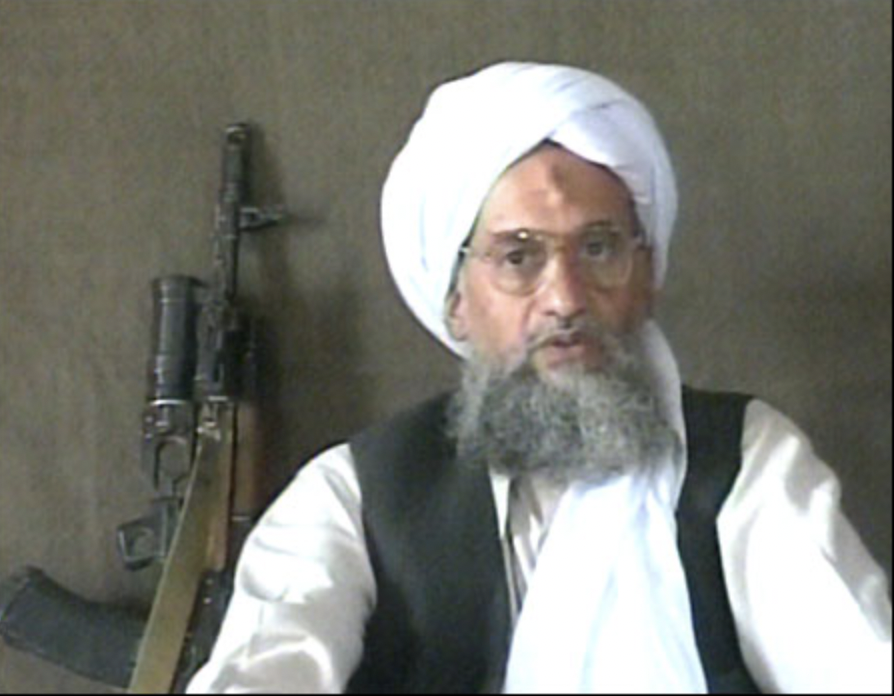
“Ramadan travel rules during Jihad? You young punks don’t know a thing about…”
5. Afghanistan is Like 1946 Germany, Sorta Kinda
What, then, was the US still doing in Afghanistan? No one seemed to know. And careers would be ruined if “we” left the place after failing to catch a single one of the WTC planners. So a new mission was devised. “We” were going to transform Afghanistan the way the US had transformed Europe after WW 2.
Yes indeed, there was a “Marshall Plan” for Afghanistan. George W. Bush announced it in 2002, and the NYT obliged by ribbing the boss a little about his sudden U-turn toward “nation-building,” then added this ponderous litotes:
“The parallel for Afghanistan that Mr. Bush drew with the Marshall Plan is both apt and inexact.”
Welp, they were half right. The NYT concluded,
“Mr. Bush said recently, ‘We fight against poverty because hope is an answer to terror.’ This is true, and suggests that the Bush administration is reshaping its view of nation-building. Afghanistan will be its first test.”
Those of you young enough not to have lived through eight years of GWB, take a good long look at Bush’s line: “We fight against poverty because hope is an answer to terror.” That kind of pious gibberish, with its wildly unmoored jump from “poverty” — a real fact about Afghanistan — to “hope,” an intentionally meaningless term, and “terror,” an even crazier noun which was supposed to explain all resistance to the Cheney Plan — that was the “civil” discourse squishy liberals revere GWB for.
Like a lot of GWB’s blather, it’s hard to come up with a translation. The closest you can get is roughly: “We’ll throw some money at Afghanistan too, but let’s get on with Iraq.”
So in this stage, the plan became “nation-building,” long after the moment when any such project could have worked.
6. Ayn Randistan
This was the moment when America’s devout belief in the free market ran up against reality in Afghanistan. You can’t exaggerate the rigid faith in The Market which possessed the US elite around the Millennium. The Market would solve all problems; that was obvious to everyone.
Thomas Friedman, high priest of elite stupidity, had a famous epiphany: No two countries with McDonald’s franchises had ever gone to war. Or, he suggested, ever could go to war. Bomb Kabul with prefab golden arches and watch peace’n’prosperity break out.
The trouble was — well, first of all, “the free market” doesn’t exist and never has. Quoting from the WaPo’s Afghanistan Papers:
“In developing countries, ‘the idea that there are perfectly functioning markets without subsidies is pure fiction, fantasy,’ Rubin, a New York University professor and leading academic on Afghanistan, told government interviewers. ‘Every late-developing country happened by government picking winners.’“
There were trained people ready to transform Afghanistan. But they were socialists — commies, in the US view.
“There was a solid pool of educated, enthusiastic, honest Afghans with bureaucratic experience. But they wanted to recreate the socialist society of Afghanistan’s ‘Golden Era’ of the mid-20th century.
“…several U.S. officials told government interviewers it quickly became apparent that people who would make up the Afghan ruling class were too set in their ways to change.”
“’These people went to the communist school,” said Finn, the former ambassador. A common Afghan fear, he recalled, was ‘if you allow capitalism, these private companies would come in and make profit.‘”
As the US occupation of Iraq went from bad to worse around 2005, there was even less energy in DC to worry about the pattern of stagnation in Afghanistan.
By 2007, the NYT was already doing post-mortems with titles like “Afghanistan: How A ‘Good’ War Went Bad,” detailing the complete failure of the ludicrous “Afghan Marshall Plan”:
“When it came to reconstruction, big goals were announced, big projects identified. Yet in the year Mr. Bush promised a ‘Marshall Plan’ for Afghanistan, the country received less assistance per capita than did post-conflict Bosnia and Kosovo, or even desperately poor Haiti, according to a RAND Corporation study. Washington has spent an average of $3.4 billion a year reconstructing Afghanistan, less than half of what it has spent in Iraq, according to the Congressional Research Service.”
All remaining investment in Afghanistan went to the war, not development.
“…[A] senior American commander said that even as the military force grew…he was surprised to discover that ‘I could count on the fingers of one or two hands the number of U.S. government agricultural experts’ in Afghanistan, where 80 percent of the economy is agricultural. A $300 million project authorized by Congress for small businesses was never financed.”
7. Dark Matter in Crates off a C-130
Maybe that money is the real story here. Because there’s something missing. Why did this mess go on so long when it never had anything resembling a reasonable plan? It makes no sense.
It makes no sense as a military operation, as nation-building, or as Imperial expansion. There’s something skewing the numbers, like the Dark Matter that makes cosmologists drink, turn religious, or just sob in their offices at night.
In the Physics of the Afghan occupation, I suspect that that Dark Matter consists of big ol’ globs of cash. Maybe the waste of two trillion dollars was the point.
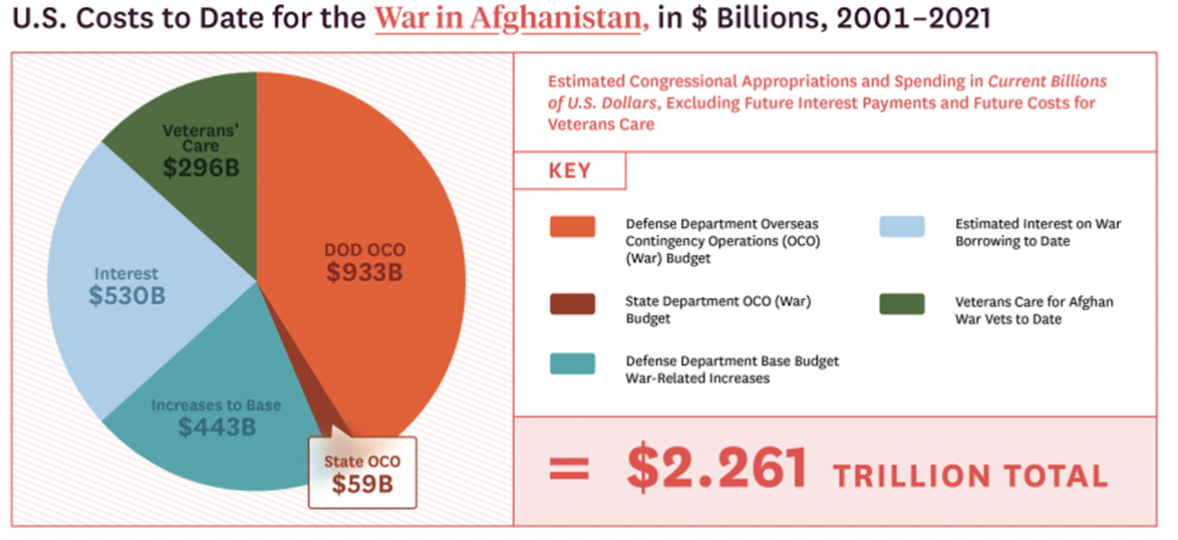
If you look at this breakdown, you see how little of it has anything to do, even in theory, with helping Afghans. Most of it is money for keeping untenable bases in Afghanistan and the rest is cost-of-doing-business, including a giant chunk for veterans’ benefits.
Here’s another breakdown showing the same massive tilt toward the Blob and its shareholders.

You can’t miss the tilt, with almost the whole 2.1 trillion dollars going to DoD contractors and a miserable $24 billion spent on economic development. That means that over two trillion went to dividend holders, private contractors, spies, and moonlighting cops.
The wonderful thing about this kind of spending, in the deeply corrupt lobbyist world of DC, is that it shunts tax dollars directly to the stockholders, connected military firms like Raytheon, Lockheed Martin, et al., legislators, military brass milking the DoD/corporate link, and even lowly CIA contractors like Johnny Spann —without angering a single taxpayer or benefitting them in any way.
When I say that this sort of obscene spending does not upset taxpayers, I’m speaking from bitter experience. You cannot get normal Americans to be upset about the price of junk like the F-35. I’ve tried. You can’t do it.
The only item in this breakdown which would upset most people is the $24 billion that might have made its way to Afghans. If you mention any of those other expenses, you’ll get “Freedom isn’t free” in one of its many variations, which vary only in diction. Try it! Hours of non-fun!
Who wouldn’t feel the temptation to prolong a money-spinning machine like this? So why wouldn’t the occupation become its own justification, the company business of DC, always a company town?
And so, rather than upset their fellow shareholders, GWB, then Obama and Trump, just nodded and smiled at the conveyor-belt of $100 bills.
Once you consider this theory, some strange trends make sense.
The one that struck me is that in 2007, when Iraq was in crisis and Afghanistan was clearly lost, Cheney’s people made a big, expensive switch in the Personnel Department, drawing down the much cheaper and more effective US Army troops and flooding Afghanistan with much more expensive, less effective private contractors. You wouldn’t do that if you wanted to win in Afghanistan, but you would if you wanted to spend money within the Blob (specifically the Erik Prince wing) and insulate a doomed Afghan war from public criticism by keeping official US Armed Forces casualties low.
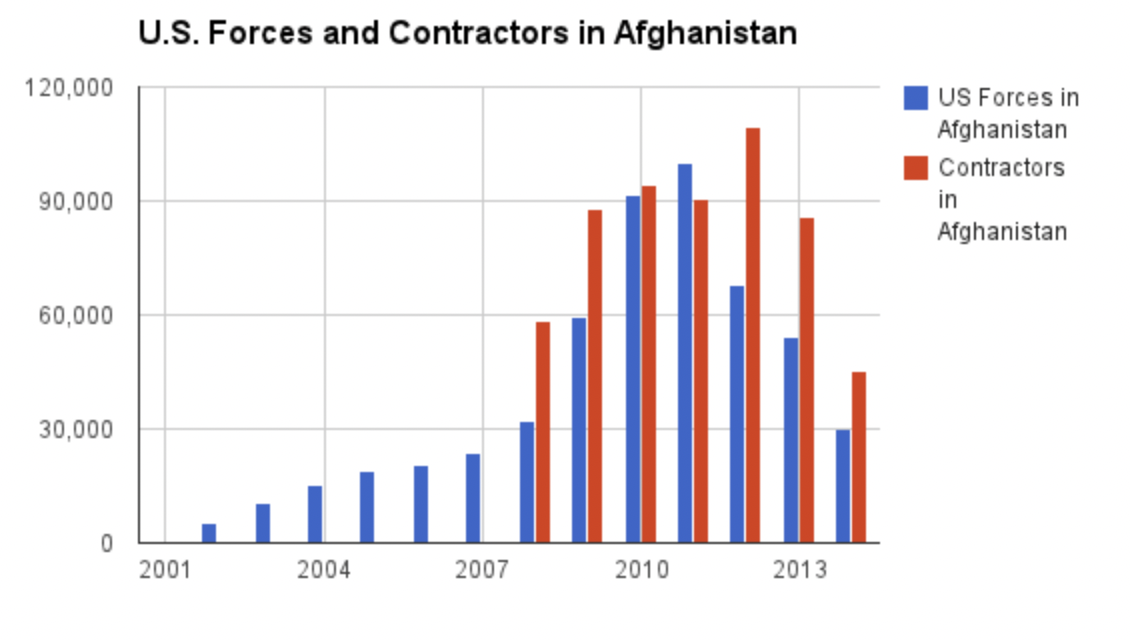
It’s an appalling vista, as Lord Denning might say. But it’s the only way to make any sense of this story.
8. “Yeah We Messed It Up But It’ll Get Worse When You Make Us Leave”
And so we come to the final stage, which in this case is not “Acceptance” but muttered sulking. It’s been a while since anyone claimed “we” could “win” in Afghanistan. The only argument for staying is that “things will get worse if we leave.”
“…If the US left, that war would be much worse, and you’d probably see the Afghan government collapse pretty quickly. Even though we do have war now, it’s not an all-out civil war with no state: We have a state, we have an Afghan security force.”
You can probably guess the most famous voice in this chorus — Hillary herself:
“Asked about the president’s decision by CNN’s Fareed Zakaria on Sunday, Mrs Clinton said, ‘Our government has to focus on two huge consequences,’ notably the resumption of activities by extremist groups and a subsequent outpouring of refugees from Afghanistan.”
That’s Fareed Zakaria interviewing Hillary Clinton…in 2021. It seems impossible, unreal, that these zombies are still walking around — and not just walking but talking. That’s the unreality of the US- Afghan War, 20 years of sinking slowly into the dirt like that Beckett play, while keeping up a constant, insanely sanguine and sanguinary chatter.

The two US invasions will be covered thoroughly in future histories of American decline, but Afghanistan will be remembered very differently from Iraq. Iraq was the great, shining disaster, the full-speed collision of world-building fantasy with actual world. Afghanistan was something else, smaller yet even darker.
It may well be that those who mattered in the US elite never even thought that the Afghan part of the grand plan would work. It was doomed many times over: by the well-known collusion of the (Afghan) Taliban and the Pakistani state; by the caricature of Afghans as noble savages, brave but hopelessly primitive; by the warped free-market doctrine that sidelined Afghanistan’s leftist elite; by competition from the preferred Iraq project; by the massive profits to be made stateside, no matter how badly things went on the ground.
Those profits are still available, which means this withdrawal won’t really happen, or will be yet another bit of show biz, with private contractors (who can be paid via unspecified agency money) staying on, doing various kinds of work, both wet and tech. Afghanistan may still be good for another trillion or so — off the books, of course.
Gary Brecher is the nom de guerre-nerd of John Dolan. Buy his book The War Nerd Iliad. Hear him read his comic memoir Pleasant Hell in audiobook format.
Subscribe to the Radio War Nerd podcast & newsletter!
Posted: August 16th, 2021
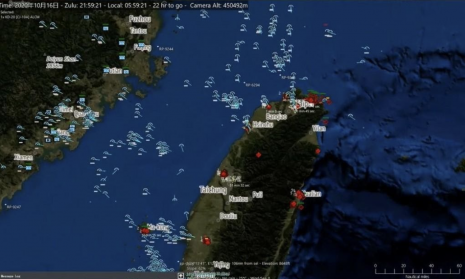
Republished from the Radio War Nerd subscriber newsletter. Subscribe to the Radio War Nerd podcast hosted by Gary Brecher & Mark Ames for podcasts, newsletters and more!
It’s a full-time job, keeping track of the US/NATO campaign to start a fire somewhere on China’s borders. It’s like tracking an inept arsonist by satellite image: “Oh, there he goes again…the idiot started a trash fire next to a concrete wall.”
Of course, no one who matters in the defense business wants total war with China. They just want to keep those trash fires burning, hoping one of them will blaze up big, like a gender-reveal wildfire. And even if none of them do, it’s good for business, because most war scares are about funding. The US Navy always, always wants more ships. What’s scarce is plausible reasons to buy them.
So when you read US analyses of the Taiwan situation, you have to remind yourself that this isn’t necessarily about a real war. That’s a lesson you learned the hard way if, like me, you’re old enough to remember the NATO/Warsaw Pact war that was always just about to happen. Looking back, it was never going to happen. The whole idea was absurd, because that war would have gone nuclear in a half hour, and nobody in power wanted that.
So when you read some hyperventilating wonk enthusing over a 21st c. Anaconda Plan to blockade China, remember that it’s budget season (because it’s always budget season at the Pentagon), and nobody who matters could really imagine that reviving the Anaconda Plan, which didn’t even work very well against the Confederacy, is gonna work against the PRC and its long-range anti-ship missiles.
There’s a catch, though. The US/NATO command may be woofing just to get more ships and planes funded, but woofing can go badly wrong. The people you’re woofing at may think you really mean it. That’s what came very close to happening in the 1983 Able Archer NATO exercises. The woofing by Reagan and Thatcher in the leadup to those exercises was so convincing to the Soviet woof-ees that even the moribund USSR came close to responding in real—like nuclear—ways.
That’s how contingency plans, domestic political theatrics, and funding scams can feed into each other and lead to real wars.
Military forces develop contingency plans. That’s part of their job. Some of the plans to fight China are crazy, but some are just plausible enough to be worrying, because somebody might start thinking they could work. Case in point, this plan to defeat a PRC invasion of Taiwan:
“The only method of preventing China from successfully annexing Taiwan is to reject calls for a cease-fire, contain Chinese bridgeheads and airheads into as small a perimeter as possible, and then drive the invaders into the sea. Contrary to the limited Army supporting role envisioned in the Pacific, an Army corps will be indispensable and must be fully incorporated into U.S. Indo-Pacific Command (INDOPACOM) Taiwan contingency plans.”
Taiwan is the most promising theater for US military planners for pretty simple, obvious reasons: it’s an island in an area where the US has massive bases. Since US military power is mostly sea- and air-based, the US can imagine (and has imagined) it could win in Taiwan. Other regions that get the most media attention, above all Xinjiang, are hopeless from a US military planner’s perspective. Xinjiang is in the middle of the world’s largest land mass, and the countries surrounding it have their own problems. A conventional US military attack there isn’t just implausible, like the other China-war scenarios; it’s flat-out impossible.
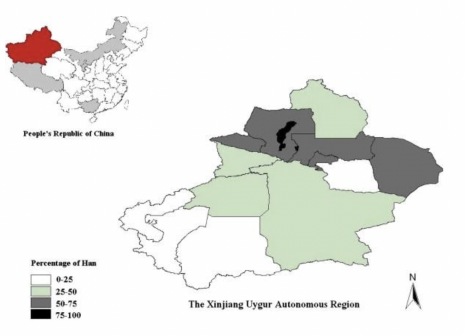
What you do with a place like Xinjiang, if you’re a CIA/DoD planner, is file it under “promote insurgency” — meaning “start as many small fires as possible,” rather than “invade and begin a conventional war.”
And in the meantime, you keep working on the real complaints of the Uyghur and other non-Han ethnic groups, so that if you do need to start a conventional war in the Formosa Straits, you can use the Uyghur as a diversion, a sacrifice, by getting them to rise up and be massacred. Since there’s a big Han-Chinese population in Xinjiang, as the map shows, you can hope to stir up the sort of massacre/counter-massacre whipsaw that leaves evil memories for centuries, leading to a permanent weakening of the Chinese state.
This is a nasty strategy, but it’s a standard imperial practice, low-cost — for the empire, not the local population, of course. It costs those people everything, but empires are not sentimental about such things.
This strategy worked well during the US attack on the Iraqi Army in Kuwait in the 1991 Gulf War. US intel used the legitimate complaints of the Iraqi Kurds and Shia, and convinced them to revolt by dropping leaflets promising US military support.
That was a lie, of course. The Iraqi Kurds were, like the Uyghur, a landlocked, stateless population spilling over into the territory of US/NATO allies, meaning it would’ve been logistically difficult and politically unwise to give them any real military support. The Iraqi Shia were more accessible, since Basra is very close to Kuwait — but the US was acting on behalf of Saudi Arabia in that war, and KSA can’t even tolerate its own Shia population. Offering effective help to Iraq’s Shia majority would have infuriated KSA, Israel, and the UAE, the only states the US worried about.
So once the Kurds and Shia had served their purpose, diverting Iraqi troops from the real front lines in Kuwait, both insurgent groups were left to the tender mercies of Saddam’s army.
BTW, if it seems I’m being too cynical here, let me add that I knew someone who was friends with a DIA agent who had the job of dropping leaflets in Iraqi Kurdistan urging the Kurds to revolt in the leadup to Operation Desert Storm. She asked him if he felt bad about stirring up a doomed insurgency. He said, “They’re all animals anyway.”
The woman who told me that story was no bleeding-heart liberal — far from it. But even she was shocked a bit. So “too cynical” is not a valid objection here.
The Uyghur in Xinjiang would serve the same purpose as the Iraqi Kurds: “straw dogs destined for sacrifice.” If you want to get really cynical, consider that the reprisals they’d face from an enraged Chinese military would be even more useful to the US/NATO side than their doomed insurgency itself.
Atrocity propaganda is very important in 21st c warfare. At the moment, there’s no evidence of real, mass slaughter in Xinjiang, yet we’re already getting propaganda claims about it. Imagine what US/NATO could make out of the bloody aftermath of a doomed insurgency. Well, assuming that US/NATO survived a war with China, a pretty dicey assumption. More likely, CNN, BBC, and NYT would be the first to welcome our new overlords, Kent Brockman style. Those mainstream-media whores aren’t too bright but Lord, they’re agile.
Hong Kong, one other widely publicized dissident region, is as hopeless as Xinjiang in terms of a beachhead for conventional war with China.
Just look at the map. Hong Kong is a great harbor but an indefensible peninsula on a heavily populated part of the Chinese coastline. Hell, the British couldn’t even hold it in WW 2 against an outnumbered Japanese invasion force. There is no way on earth it could be held against the PLA for even a day.
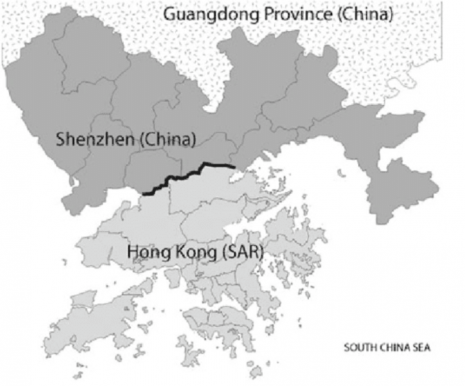
It’d be easier to defend Berkeley against the rest of America (a cool scenario, BTW — I wonder if anybody’s made it into a video game). Constantinople in 1453 would look like victory compared to any attempt to defend Hong Kong. Ever see Bambi vs. Godzilla? Like that.
Even as propaganda, Hong Kong won’t work very well. We know this, because it’s been tried, and didn’t pan out.
You may have noticed that a couple of years ago, stories on Hong Kong dissidents were constant in Anglo media. They’ve all but vanished now, in favor of Xinjiang stories. There are two reasons for this, and the difference in these two reasons illustrates something important about the weird double-vision of 21st c. conflict.
First, Hong Kong is an open society, stuffed full of good reporters. That means that it’s hard to reduce the problems there to a simple morality play. You can do that in Xinjiang because facts on the ground are very scarce (and nobody in the media wants to go there and spoil the dream, either) — but you can’t in Hong Kong. It’s a purely urban, argumentative, hyperliterate, online place, and ten minutes googling disabuses you of any notion that it’s a simple story of bad PRC vs. good dissidents. Families are deeply split, people are talking and acting messily on every side, and it’s just too much like real life to make a good sermon.
Xinjiang, by contrast, can easily be imagined as One Giant Concentration Camp. After all, our leading “expert” on the province has never been there, and neither have his readers.
So, if you’re a US/NATO planner, you file Xinjiang under “diversionary doomed insurgency, with PR benefits,” and Hong Kong under “agent recruitment/sleeper cells,” and consign both to small, side bets. That’s all you need to do, and given the godawful military record of US/NATO forces in recent warfare, that’s all you really want to do. You don’t want war. You may get it, but you don’t want it.
You’re running out of places to confront China at this point. Where else, Tibet? That’s been tried.
From the moment the PLA launched its uncharacteristically gentle takeover of Tibet in 1950, right up to the time Nixon and Kissinger started cozying up to Mao, US intelligence tried to create a Tibetan insurgency. You can guess how that went. It’s downright amazing the way US intel refused to concede that one of the few things Marxist-Leninist regimes were really good at was espionage and (especially) counter-espionage. A lot of trusting Tibetans died in those campaigns. A lot of Agency men got promoted. It’s a grim story.
So what’s left? Not much. China is just a hard target, as the past 70 years have shown. The Han-Chinese majority is becoming more nationalistic every year. The economy is booming, on the verge of knocking the US off the number one spot it’s held for 150 years. China has played this century smart, staying out of the black hole of Middle Eastern wars, picking up friends quietly, letting the US state make enemies.
Only Taiwan offers any hope to US military planners. And even that hope isn’t much. Back in the 1950s, US intel had high hopes that the remnants of the Kuomintang in Taiwan could be used to stage a Pacific D-Day, storming the beaches of Fujian and overthrowing the Communists. US rightists even had a slogan, “Unleash Chiang Kai-Shek,” which was kind of like threatening to unleash your Papillon-Shih-Tzu cross on the Lion Safari Park next door.
Truman listened to his saner generals and announced in 1950 that the US wouldn’t intervene in China/Taiwan disputes over the Formosa Straits. But the US elite was deeply factionalized even then, at the height of American power, and powerful elements of the DoD weren’t willing to let China alone.
MacArthur’s open 1951 revolt in Korea showed that elite commanders were willing to use nukes (34 of them, to be exact) to get rid of the CCP.
A real war with China was off the table, once the US military lost its 1950s infatuation with nukes, for the simple reason that nukes were the only possible way the US could win a war with China. The USSR came to the same conclusion during its 1969 border war with China, and may even have sounded out the US for permission to use these taboo weapons against Mao.
The only real scenario which offers US forces a chance to accomplish anything in military terms depends on China invading Taiwan. That’s the only reason you see so many articles in the Anglo media asking hopefully, “Will China Invade Taiwan?” I swear, they’re like kids on Christmas Eve, dreaming that Chinese fleets will swarm the Formosa Straits, making the Americans’ obsolete naval and air assets meaningful again.
You’ll notice that it’s a USN admiral leading the PR campaign boosting a PRC invasion of Taiwan. It’s downright embarrassing, how transparently this guy Aquilino is drooling over the prospect of a good ol’ fashioned 20th c. naval war in the Formosa Straits. He might as well order up some commercials with the slogan, in Mandarin and English, “Puhleeeze, China! Invade Taiwan! Make the US Navy relevant again!”
It reminds me of those sad commercials that California almond farmers ran when I was young, begging you to gobble “A can a week, that’s all we ask.”
It won’t happen, of course. No one really thinks it will, including Aquilino and his planning staff. The era of naval war based on carrier groups is over. They know that, even if they won’t say it.
If there’s a real war with China, the carriers will wait it out in San Diego harbor. I don’t say Honolulu, because even that wouldn’t be safe enough.
I’m not denigrating the courage or dedication of the crews and officers of USN vessels. At any level below JCOS, most of them are believers. But their belief is increasingly besieged and difficult to sustain, like an Episcopalian at Easter. You just can’t think too long about how cheap and effective antiship missiles are and still be a believer in aircraft carriers. As platforms of gunboat diplomacy against weak powers, they’re OK. No better than OK, as the USN showed in Lebanon in 1983, when it managed to lose two A-6s in one day, after the IDF’s air force had demolished the Syrian AF, knocking down 82 SAA aircraft and gutting their air defenses without losing a single plane.
The moral of that Lebanon story, not that anybody in DC wants to learn it, is that if you’re gonna do gunboat diplomacy, it’d be safer and about a thousand times cheaper to do it with actual gunboats than with carriers.
And that’s not even considering what would happen to those unbelievably expensive carriers in an all-out conventional war with China. The Pacific would gain some overpriced artificial reefs, and a lot of decent, trusting sailors would die without inflicting any damage on the “enemy.”
But the scenario is useful, useful for funding, which is the real purpose of the DoD. You all know the F-35 story by now, so I don’t need to go over it again, but keep the moral of that story in mind: defense appropriations have nothing to do with defending and everything to do with business.
At the moment, the eager scenarios promising that “we” could defeat a PRC invasion of China are so deeply stuck in 1940s strategic thinking that you might as well get your military news from the reenactors who show up at the park on weekends to bang each other up with homemade swords. That’s over too, but at least it doesn’t cost as much money or as many lives as a carrier-based attempt to defend Taiwan would.
Very few of these articles bother much with what’s going on in China itself. China is just The Enemy, the red force in some Fort-Irwin scenario that gives aspiring officers a chance to shine. The thing is, and it’s weird you even have to say this: China is a big strong country coming out of an era of deep national humiliation and suffering, proud of its new prosperity. China’s success in lifting a desperately poor population into something like prosperity will likely be the biggest story from this era, when the canonical histories get distilled.
A nation hitting this stage is likely to include a lot of people, especially young men, who are itching to show what their country can do. Their patriotic eagerness is no doubt as gullible as most, but it’s real, and if you pay any attention in the online world, you can’t help seeing it.
People who mouth off about China never seem to imagine that anyone in China might hear, because as we are told over and over again, China-is-an-authoritarian-state. The implication is that nobody in China has any of the nationalistic fervor that we take for granted in our own Anglo states.
The only time you see anything about Chinese nationalism is when it’s used as one element of the war-fever talk: “Look! China’s gnashing its teeth! Buy us more carriers!” This is how most sources interpret the “Wolf Warrior” meme.
Wolf Warrior is a nationalistic Chinese war movie. That’s where the term “Wolf Warrior Diplomacy” comes from. The existence of such movies is deeply alarming…to the people who’ve watched Rambo II and III every night for decades, cheering every time Stallone shoots an NVA man with a arrow. (I say “*a* arrow” advisedly. “*An* arrow” gives far too much credit.) This stuff is so transparently stupid. It’s odd that life-long jingoists might be alarmed to discover that another great power has its own patriotic feelings, its own demographic eager for tales of martial glory.
If you know any recent Chinese history, any at all, then the PRC’s desire to reintegrate Taiwan doesn’t seem a very aggressive or frightening development, for the simple reason that the US used to be the most fierce advocate of Taiwan/Mainland China unity, to the point of madness. Until Nixon and Kissinger abandoned Taiwan for Beijing, the US was, to use a newspaper word, “adamant” that there was only one China.
And even after the big visit, years passed before the US acknowledged publicly that the PRC existed. Until 1979 — 1979! — the US insisted with a straight face that Chiang Kai-Shek’s exiled elite in Taiwan were the only legitimate government of China, all China, from Xinjiang to Taipei. The PRC did not exist. There was no US diplomatic representation in Beijing, no official contact. Everything had to be done by a farcical go-between, usually some European country willing to concede that Taiwan did not actually rule in Beijing.
At this point, the US/NATO elite believed more strongly than the PRC elite does now that there is only one China — that the mainland and Taiwan were part of the same country. That was the whole basis for ignoring the PRC.
Given the history of US/China relations, from the pogroms against Chinese immigrants to the Chinese Exclusion Act of 1882, through the demonization of Chinese mainlanders in the Cold War (which I remember distinctly from elementary school scare movies), the endless attempts to start insurgencies in Tibet, Xinjiang, and Fujian, to the nonstop violence and abuse of Asians in America, you don’t need to find reasons for Chinese people to want a war.
The odd thing is that most of them don’t seem to. That’s a remarkable testimony to the discipline and good sense of the Chinese public…so far. And it’s also, if you’re thinking clearly, a good reason not to keep provoking China in such gross, pointless ways. A population with that level of discipline and unity, matched with zooming prosperity, technical expertise, and pride on emerging from a long nightmare, is not one to woof at.
Of course the plan in the Pentagon is not real war. The plan is to slow China down, trip it up, “wrong-foot it” as they say in the Commonwealth.
Along the way, all of the populations Western media consumers are exhorted to care about can be sacrificed. They’ll vanish as quickly as the Tibetans vanished when their usefulness was exhausted. (Adrian Zenz started as a Tibetan specialist, BTW. He switched to Xinjiang when the bottom fell out of the Tibetan-provocation market in the 1990s.)
So what will China do about Taiwan? China could take it right now, if it wanted to pay the price. Everyone knows that, though many fake-news sites have responded with childish, ridiculous gung-ho stories about how “Taiwan Could Win.”
But will China invade? No. Not right now anyway. It doesn’t need to. The Chinese elite has its own constituencies, like all other polities (including “totalitarian” ones), and has to answer to them as circumstances change.
So far China has been extraordinarily patient, a lot more patient than we’d be if China was promising to fight to the death for, say, Long Island. But that can change. Because, as I never tire of repeating, the enemy of the moment has constituencies too. And has to answer to them.
So what happens if the US succeeds in hamstringing China’s economy? Welp, what’s the most reliable distraction a gov’t can find when it wants to unite a hard-pressed population against some distant enemy?
That’s when China might actually do something about Taiwan. Oh, not the silly 20th c. style invasion the USN dreams about. That’s nonsense. The PLA has contingency planners too, and they won’t want to play those retro games. There’s a whole new military technology and an evolving strategy to optimize it, and it includes dozens of ways to neutralize carrier battle groups. Planning that campaign is probably the most requested assignment among ambitious PLA planners.
And that’s how this looks, when you stare coldly: If our military and media elites are very lucky, China will zoom ahead and ignore the endless woofing. But if US/NATO somehow succeed in crippling China’s economy, then, as Mao might put it, the flabby Golden Retriever woofing behind its picket fence at the pit bull might find that the yard gate is open.
Or, to come down out of the metaphors: Taiwan is a permanent, legitimate casus belli for China. It can be ignored when things are going well domestically, but is always available for use if the economy goes badly and the PRC elite needs a distraction.
It will be interesting to see how the Anglo media, now doing its Sidney Ferocious routine, reacts when and if that happens. My money is on a light-speed Kent Brockman flip.
Gary Brecher is the nom de guerre-nerd of John Dolan. Buy his book The War Nerd Iliad. Hear him read his comic memoir Pleasant Hell in audiobook format.
Subscribe to the Radio War Nerd podcast & newsletter!
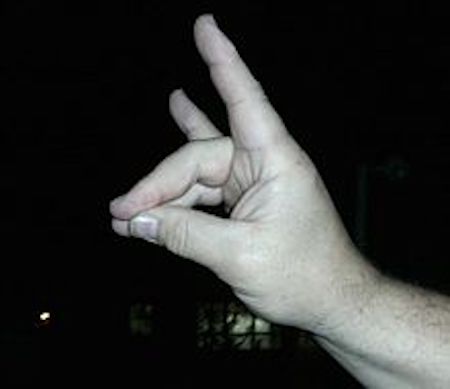
Republished from the Radio War Nerd subscriber newsletter. Subscribe to Radio War Nerd co-hosted with Mark Ames for podcasts, newsletters and more!
There’s a gigantic, well-organized, extremely violent fascist group with tens of thousands of active members in Germany right now.
And nobody notices.
You’d think all the fascist-hunters would have sniffed it out by now, but it goes right by them as if these guys were invisible.
Which is odd, because this group is not trying to hide, or pretending to be harmless. They’re not shy about it, and it’s not just talk. They have quite a record. They’ve been rampaging for decades, and if anything they’re stronger now than they used to be. They’re closely linked to CIA and Nazi groups; they’re very busy beating, burning, and murdering minorities of all kinds, and boast quite openly about hating literally everyone who’s not a member of their own ethnic group and sect, even suggesting that members go on “hunting expeditions” against minorities which they’d already almost wiped out back in the 20th century. (more…)
Posted: November 14th, 2020
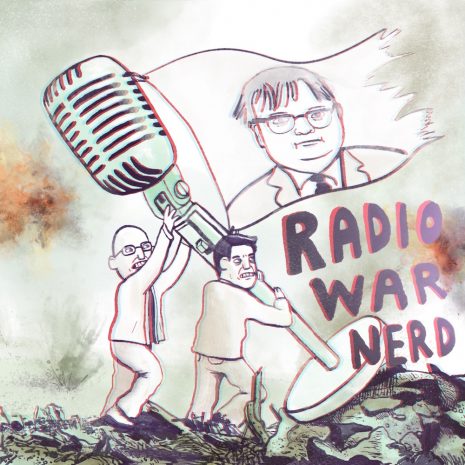
Republished from the Radio War Nerd subscriber newsletter. Subscribe to Radio War Nerd for podcasts, newsletters and more!
What, you thought you were safe? You’d get through the big “Cancel Culture” war without me popping off?
No such luck.
Public morality should be pretty simple. When an oppressed group gets enough power to make its oppressors behave, they will do so — and they should.
The real problem, the kind of thing that would make De Niro in Casino groan, “Amateur night!”, starts when people imagine that they can stop immoral behavior by policing immoral characters, phrases, or scenes in literature.
They’re looking for the wrong thing. They’re sniffing for depictions of immorality, when they should be scanning the silences, the evasions.
There’s a very naïve theory of language at work here, roughly: “if people speak nicely, they’ll act nicely” — with the fatuous corollary, “If people mention bad things, they must like bad things.”
The simplest refutation of that is two words: Victorian Britain.
Victorian Britain carried out several of the biggest genocides in human history. It was also a high point of virtuous literature.
Because they were smart about language. They didn’t rant about the evil of their victims or gloat about massacring them, at least not in their public writings. They wrote virtuous novels, virtuous poems. And left a body count which may well end up the biggest in world history.
Open genocidal ranting is small-time stuff compared to the rhetorical nuke perfected by Victoria’s genocidaires: silence. The Victorian Empire was the high point of this technology, which is why it still gets a pass most of the time. Even when someone takes it on and scores a direct hit, as Mike Davis did in his book Late Victorian Holocausts, the cone of Anglosphere silence contains and muffles the explosion. Which is why Late Victorian Holocausts is Davis’s only book that didn’t become a best-seller.
Davis was among the first historians with the guts and originality to look hard at some of the Victorian creeps who killed tens of millions — yes, tens of millions — of people from the conquered tropics:
“The total human toll of these three waves of drought, famine, and disease could not have been less than 30 million victims. Fifty million dead might not be unrealistic.”
An English radical of the Victorian Era, William Digby, saw the scope of the horror: “When the part played by the British Empire in the nineteenth century is regarded by the historian fifty years hence, the unnecessary deaths of millions of Indians would be its principal and most notorious monument.”
But that didn’t happen. There was no wave of conscience among historians of the British Empire in the 1920s (or 30s or 40s or, to end the suspense, ever.)
Davis puts it bluntly: “[T]he famine children of 1876 and 1899 have disappeared.”
How did this happen? Why is it still happening? What are the lessons for those studying literature, propaganda, and ideology?
They’re very grim lessons, as it happens. While grad students comb texts for improper remarks, they miss the real point: the vast silence, and the paint-job of virtue that helps distract us.
Ideology doesn’t seem to do any good at clearing away the bigotry of Imperial history. Charles Kingsley, prominent novelist of mid-nineteenth-century Britain, was honored as promoter of socialist causes — while he wrote in letters to his wife about his loathing for the “white chimpanzees” whose corpses were littering the roadside when he visited Sligo during the Famine in the 1840s.
We go to his Wiki for a quick bio of Kingsley, and the first thing we find is “working men’s socialism.” Sounds good, right? Not if you’ve steeped yourself in the vile culture of mid-19th c. Britain. It sounds like boasting maybe, but it’s the simple truth: as soon as I saw that subhead, I KNEW, for certain, that Kingsley must have hated the Irish. And sure enough, there’s a whole subhead on his “Virulent Dislike of the Irish”:
Virulent dislike of the Irish
Kingsley was accused of racism towards the Roman Catholic Irish poor and described Irish people in rabid and virulent terms.
Visiting County Sligo, Ireland, he wrote a letter to his wife from Markree Castle in 1860: “I am haunted by the human chimpanzees I saw along that hundred miles of horrible country [Ireland] … to see white chimpanzees is dreadful; if they were black one would not see it so much, but their skins, except where tanned by exposure, are as white as ours.”

Kingsley statue in Devon. Never to be kissed by sledgehammer, because the only historical conscience the UK has is imported from the US, where no one’s even heard of Kingsley.
Someday (not in my lifetime), the UK Left will have to deal with this stuff. Your movement comes straight out of Cromwell, the Gordon Street rioters, and the Baptists, all steeped in ethnic/sectarian hate. I’m not telling you what to do, but noticing that fact would be a start.
Kingsley wrote several best-sellers after the Great Famine. It shouldn’t come as a surprise that none of them have anything to do with the Famine. These people were cunning, if mediocre; they saved the bile for private letters about “white chimpanzees.”
But it’s easy to dismiss Kingsley as a middlebrow entertainer.
Let’s take a far more serious case: Eric Hobsbawm, still revered as canonical Marxist historian of the UK. As Davis notes, Hobsbawm does “mention” the Irish Famine, but — and if any phrase ever deserves to be written in all-caps, this phrase from Late Victorian Holocausts does: “Hobsbawm…makes no allusion in his famous trilogy on nineteenth-century history to the worst famines in perhaps 500 years in India and China.”
There are no excuses for this. There are reasons, but as the song says, “It doesn’t make it all right.” Still, once the rage passes and you stop clenching your jaw ’til it aches, there are reasons. Most of all, there’s a deep Imperial skill in the trope of silence. The stupid Nazis ranted and raved and lasted 13 years, then got completely destroyed. The Empire kept its rants for private letters, passed on to a guild of coopted historians, pundits, and publishers—and has never been called to account.
Maybe it never will be. That poor optimist radical Davis mentions thought the exposé would be big news by 1925. Well, it’s 2020, and the Empire is still remembered fondly. Victoria herself is a beloved figure all over again.
Silence is the only really effective PR for a genocide, and the nature of artificial famines, as opposed to mass executions, makes silence particularly effective. Famines, most people still believe, are acts of God, or matters of chance, or perhaps (under their breath) the result of the sheer fecklessness of the victims, for being Papists as in Ireland, or Hindus as in India, or Muslims as in contemporary Somalia. After all, the Empire wasn’t standing people up against a wall and shooting them (except sometimes, as in Kenya, and the Empire handled that by putting the records on ships and dropping them into the Indian Ocean.)
Silence, not Nazi-style boasting. That’s the key. We should be looking for omissions, not gaffes. Gaffes are for hicks like Hitler. Silence is the grown-up way to hide vast genocides.
The key to effective silence is to coopt, not alienate, your intelligentsia. The hick Nazis drove out or killed their intellectuals; the Empire suborned and coddled its writers and poets, often promoting those of little talent (whose works are still vaguely canonical), adding intellectual insecurity as another motive for collusion.
Tennyson makes a good start here. Anybody associate Tennyson with genocide? Didn’t think so. He never mentioned it — in his canonical writings. He and Victoria were neighbors, chums, and he won every honor the Empire could bestow, despite being by general consent the stupidest “major” poet in the canon.
You’d never link Tennyson to genocide, until you look at his private letters and his friends’ memoirs. Then you see the perfect melding of silence and violent hatred, as in Kingsley, as in case after case after case that you never hear about — and if you do dare to mention one of the cases, will get you a grumpy, “Oh yes, we know about all that, they held some pretty objectionable opinions, as was common at the time…” (I wish I could do the inflection on “pretty objectionable.” It’s one you hear often among Commonweath academics, especially after the second drink.)
I once read Tennyson’s letters and found to my shock that he had visited Famine Ireland. Even in his letters there is not one mention of the dead. What you do get is a set of rules he laid down, as a celebrity, to his hosts as he made his way from one vampire castle to the next (never mind Mark Fisher, these guys were the real thing): he was not to be spoken to about “Irish distress,” and the window shades of the carriages in which he rode from one Ascendancy manse to another were to be kept completely shut, lest he see the bodies.
You can see why Bram Stoker, a minor Ascendancy Igor, did his best to move Nosferatu as far to the east and south as he could. As poor Byron, the one real hero of British literature, pointed out, the “moral North” always preferred to place evil as far to the east and south of Britain as it could.
So I read these letters in New Zealand and wrote to the leading Tennyson biographer, asking, “Can you explain to me why you’ve never written on Tennyson’s visit to Ireland?” He replied, “I suppose (!) because Tennyson never mentioned it.”
That, folks, is how you cover up a genocide. It’s leaked a little in the 170 years since it was successfully carried out. But it lasted longer than any other cursed tomb in history. Nowhere — not in Dublin, not in London — was there any commemoration of the Famine on its 50th anniversary in 1897, or its hundredth in 1947. In 1998 Blair gave a very carefully-worded quasi-apology, and I still remember Jeremy Clarkson’s response: “I see Blair has apologized to the Irish for poisoning their potatoes.”
In short, this method works. We are its products; we live in the delusion it created, and like it or not, Hobsbawm and a host of other Igors have that blood on their hands along with the outright vampires. Sometimes you end up angrier at the Igors than the Nosferatus.
So the key to radio silence over a genocide is cooption — very, very literal, straightforward cooption. The best candidates are novelists and poets, especially mediocre ones.
Many imperial officials moonlighted in both the active (killing) part of the genocides, and the passive PR side. Many were very popular writers, and all their doorstop books were virtuous, virtuous, oh so virtuous.
The vilest of the lot, perhaps, was Robert Bulwer-Lytton, First Earl of Lytton, the Famine Queen’s fave poet, whom she pushed for the post of Viceroy to India. After getting the post in 1876, Lytton presided over artificial famines that killed tens of millions of Asians.
No one outside India seems to mind, or even remember, that side of his life. He is remembered only as the son of Edward Bulwer-Lytton, the cuddly old silly who wrote “It was a dark and stormy night,” the inspiration of those “Worst Opening Sentence” competitions.
Lytton’s novelist father was a monster too, but he could only terrorize his family and servants. As Viceroy to India, his poet son was able to inflict, and then cover up, misery on a much more vast scale. As Mike Davis says:
“The Central Government [of British India] under the leadership of Queen Victoria’s leading poet, Lord Lytton, vehemently opposed efforts…to stockpile grain or otherwise interfere with market forces. All through the Autumn of 1876, while the kharif crop was withering in the fields… Lytton had been absorbed in organizing the immense Imperial Assemblage in Delhi to proclaim Victoria Empress of India (Kaiser-e-Hind). As The Times [of London]’s special correspondent described it, ‘The Viceroy seemed to have made the tales of Arabian fiction come true…nothing was too rich, nothing too costly.’ [This feast] ‘achieved the two criteria [set for Lytton], of being ‘gaudy enough to impress the orientals’ and…a pageant which hid the nakedness of the sword on which we really rely.’ An English journalist later estimated that 100,000 of the Queen-Empress’s subjects starved to death…in the course of Lytton’s spectacular durbar.”
But don’t expect to find anything in Lytton’s poems about these artificial famines. He wasn’t that dumb.
The poems are astoundingly dull, and the most surprising thing about the repeated charges of plagiarism that were made against them is that Lytton could steal so much decent poetry and make such complete crap out of it.
Well, he was an Earl, Victoria swooned for him, and above all, he had no more conscience than a weasel. In short, he was the man for his time and place. He fit right in there — because the Victorian elite were unquestionably the worst human beings who ever lived.
“Including the Nazis?” Yes. No contest, once the Indian and Chinese intelligentsia give us what we’ve never had: an accurate body count for Victoria’s Empire. Or, if you prefer, consider the timelines: Nazis, 13 years in power; Britain’s tropical genocides, a century at least.
What do you find, then, when you look for literary “clues to the horror” in Lytton’s poetry? Nothing. English-Department products will never admit that, if only because it precludes all sorts of Blackadder-level cunning that find all sorts of secret guilt in unlikely places like Wuthering fucking Heights. (Sorry Terry Eagleton, you probably meant well.)
These people had no conscience. Don’t waste time looking for one.
Here’s a sample of the endless “novel in verse” Lytton wrote (under the pseudonym “Owen Meredith” — not to be confused with George Meredith, a talented poet and radical who doesn’t deserve the shame of being taken for Lytton).
You really don’t need more than a sample of Lytton’s vaporous drone. Read it and sleep:
But scarce had the nomad unfurl’d
His wandering tent at Mysore, in the smile
Of a Rajah (whose court he controll’d for a while,
And whose council he prompted and govern’d by stealth);
Scarce, indeed, had he wedded an Indian of wealth,
Who died giving birth to this daughter, before
He was borne to the tomb of his wife at Mysore.
His fortune, which fell to his orphan, perchance
Had secured her a home with his sister in France,
A lone woman, the last of the race left. Lucile
Neither felt, nor affected, the wish to conceal
The half-Eastern blood, which appear’d to bequeath
(Reveal’d now and then, though but rarely, beneath
That outward repose that concealed it in her)
A something half wild to her strange character.
The nurse with the orphan, awhile broken-hearted,
At the door of a convent in Paris had parted.
But later, once more, with her mistress she tarried,
When the girl, by that grim maiden aunt, had been married
To a dreary old Count, who had sullenly died,
With no claim on her tears—she had wept as a bride.
Said Lord Alfred, “Your mistress expects me.”
The crone
Oped the drawing-room door, and there left him alone.
There was a time when I could have spun a cunning hermeneutic web here, revealing the scandalous insight that in this passage, the “Indian of wealth” has only one purpose: to die, leaving her wealth to that white guy.
But that’s grad-school crap, deserving no more than a Butthead “Well DUH, dumbass!” Orientalism has made a lot of careers and missed the big point.
That’s not the real work of poems like this. Their real point is to exist. It’s to be long, to be maudlin, and to be inoffensive to the original audience.
You won’t find gloating, you won’t see death’s heads on every officer’s cap. That stuff was for the Nazis, who were hicks themselves. The pro’s, like Lord Lytton, wrote virtuous, vapory blather like this. Reams of it. Best smoke-screen a genocidaire could want.
Lytton let 6 or 7 million peasants starve, in what had been the rice bowl of the world, for reasons which will sound familiar to readers familiar with the work of Amartya Sen — ideological, “free-market” decisions that somehow always managed to wipe out populations which had been annoying the Empire.
BTW, you can see classic port-sipping Donnish rage in sites reacting to Sen’s work, like this one.
Lytton’s callousness has been ascribed, when it gets mentioned at all, to the fact that he was a lunatic, an opium addict, a lifelong jerk, etc. He was all those things, but you’re playing into the hands of the Imperial rear guard (HQ Oxbridge and London) if you start pondering individual psychology.
As Davis says,
“[I]n adopting a strict laissez-faire approach to famine, Lytton, demented or not…[was] only repeating orthodox catechism…He issued strict, ‘semi-theological’ orders that ‘there is to be no interference of any kind on the part of the Government with the object of reducing the price of food,’ and in his letters home to the India Office and to politicians of both parties, he denounced ‘humanitarian hysterics.’…By official dictate, India like Ireland before it had become a Utilitarian laboratory…Grain merchants, in fact, preferred to export a record 6.4 cwt of wheat to Europe in 1877-78 rather than relieve starvation in India.”
“As in Ireland” indeed. The parallels between India after the 1857 “Mutiny” and Ireland after repeated rebellions are obvious, and have been pointed out many times.
In both cases it was not simply free enterprise dogma that doomed the victims: both populations were seen, bluntly put, as vermin, and many officials were not shy about saying God Himself was taking a hand to rid the Empire of them.
Indian intellectuals, from Sen onward, have been much braver than most victims in dealing with Imperial hatred of their ancestors.
After the 1857 rebellion in India was crushed, the whole culture of the Raj changed. Many early 19th c. British occupiers had dabbled in local cultures, but after 1857, this was derided as “going native.” Instead of pre-Victorian eccentrics, often brilliant and downright weird, the Raj snapped into line hard and demanded laconic, effectual mediocrity — men of few words and fewer thoughts, “men of action” whose echoes you can still hear in Wodehouse characters (always bad guys) who are archly described as “Empire-builders” or “the kind of man who made Britain what it is.”
After the 1857 “Mutiny”, the Raj repented of its brief flirtation with the cultures of the Indian center and began recruiting “frontier tribes,” especially Pashtun, who had no loyalty to pre-Conquest India. Once the Suez Canal was finished, Raj officials were able to live in a virtual Britain, dealing with Indians as little as possible:
“British contacts with Indian society diminished in every respect (fewer British men, for example, openly consorted with Indian women), and British sympathy for and understanding of Indian life and culture were, for the most part, replaced by suspicion, indifference, and fear.”
I’m going to deal with literary responses to the Irish Famine of the 1840s rather than the Indian famine of the 1870s, for two reasons —one lame, and one a little more plausible. The lame one first: I know the literature of the 1840s and 50s better than that of the 1870s. Now the reasonable one: the UK literary/intellectual world could claim ignorance of what was happening far away in India, but no one who could read a newspaper in London could claim not to know that a million people, fellow citizens of the UK, were dying in huge numbers just a few miles away.
So let’s look at the best-sellers of that era — not like poor Eagleton, desperate to find some saving grace, but coldly, seeing, as Stevens would say, “Nothing that is not there/And the nothing that is.”
A little context, for those lucky enough not to have wasted years on this very Schopenhauerian story: there were bad crops in much of Europe in 1845-50, but in most of the Continent, local organizations were able to provide some bare minimum of relief. As Amartya Sen said, lethal famines happen when shortages strike populations with no power, either financial or political. These are populations already hated by their rulers, and to put it bluntly, their rulers welcome the famines.
The tater, which had been imported from Peru by Spanish conquistadors in the 16th century, were the perfect slave-food. European peasants relied on the potato all across the northern tier, not just in Ireland. Ever see that Van Gogh painting, “The Potato-Eaters”?
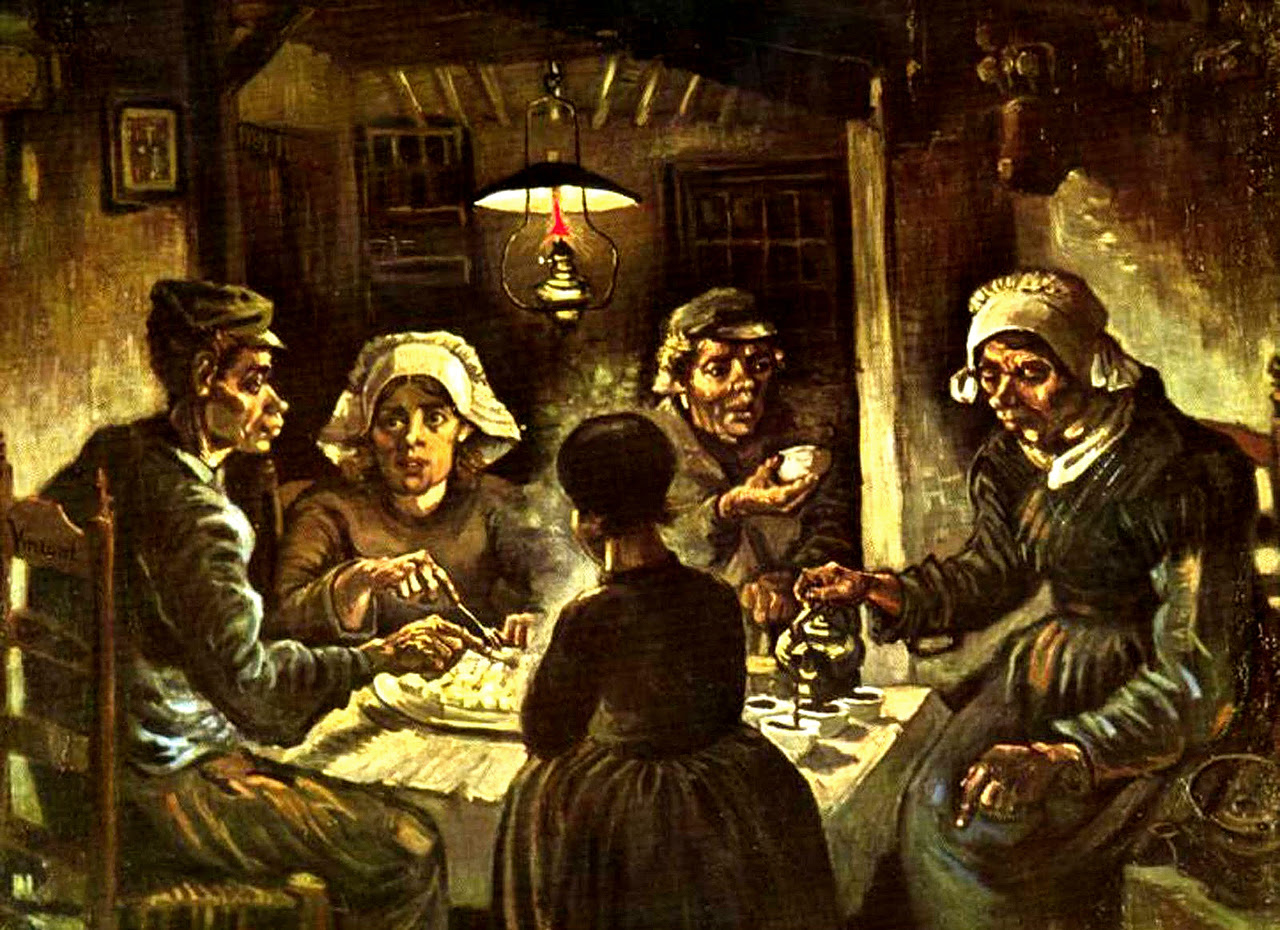
The painting is from 1885, almost 40 years after the Potato “famine.” Europe’s poorest returned to eating potatoes, the cuisine of no-choice.
What did their potato-eating ancestors in Flanders do when the 1840s blight came? They survived thanks to local organizations that were able to limit the harm caused by crop failures:
“Flanders is a typical case where local communities carried the heaviest burden in organising and financing relief, control and repression activities. In the crisis years about two-fifths of the people in the most affected areas received some form of communal aid. In the Netherlands in 1847 18% of the people were supported by local relief boards, against 13% in 1840-1844. In some regions the numbers supported doubled. In France expenditures of the local relief boards doubled between 1843 and 1847, often financed by an extra ‘poor tax’. The same pattern is seen in South Germany.”
In Flanders, in France, in Germany, those at risk were hated only in the relatively mild way that the rich always hated the poor — a hatred tempered by the fact that the elites saw these wretches as belonging to their own group.
Not so in Ireland, in the Highlands of Scotland (which shared a history of stubborn Papism, a different language, and chronic rebellion) — or India in the 1870s.
The British elite began to nourish a particular hatred of India, especially Hindu regions of India, after the 1857 Rebellion. The uprising by supposedly loyal local auxiliaries drove the occupiers insane, in a way that would have been very familiar to any survivors of the Irish Famine of the 1840s.
In both cases, clever Imperial officials said nothing incriminating, but in the 1847 crisis, some high officials had not learned their lesson properly and said bluntly that any famine that wiped out a troublesome population was a good famine — sent by God, in fact.
Trevelyan, the official in charge of dealing with the crisis, said, “The judgement of God sent the calamity to teach the Irish a lesson, that calamity must not be too much mitigated.”
They talked a lot about the “moral evil of the people” as the real cause of mass starvation, and said outright that,
“We must not complain of what we really want to obtain. If small farmers go, and their landlords are reduced to sell portions of their estates to persons who will invest capital we shall at last arrive at something like a satisfactory settlement of the country.”
What you see here is free-market ideology, yes — but you can’t make the mistake of dismissing ethnic hatred as unreal, therefore not a factor. If free-market ideology had been as cold and rational as it claimed (and still claims) to be, poor people all over Britain would have been left to rot by the roads.
Ethnic hatred is real, and it exercises a real power over ruling elites’ decisions. There’s a strain of Leftist intellectual inclined to deny this at all costs, in the way that abuse victims who get religion blame their rape memories and whip scars on “Satan” rather than their stepfather.
The “socialist” polemics of Charles Kingsley are an almost ridiculously clear example of the way ideology did NOT help any Imperial writers to see what was in front of their eyes.
What did Charles Kingsley offer to the British public in 1848, when the Famine was wiping out the Irish-speaking peasantry? Ladies and Gentlemen, I offer you…drum roll…YEAST!
“Motivated by his strong convictions as a Christian Socialist Kingsley wrote Yeast as an attack on Roman Catholicism and the Oxford Movement, on celibacy, the game laws, bad landlords and bad sanitation, and on the whole social system insofar as it kept England’s agricultural labourer class in poverty. The title was intended to suggest the ‘ferment of new ideas’.”
You have to admire, or flinch, at the sheer proto-Trumpian reversal here: It’s not that our Empire is wiping out a long-hated Papist peasantry via artificial famine; it’s the Papists who are ruining our agriculture back home in England!
Kingsley’s novels contain no mention of “white chimpanzees.” He had the Imperial method: save that stuff for letters to your wife.
His real work, and I wish to God people would see this, was to write sentimental, virtuous porridge. Right through the Famine years, Kingsley wrote about every kind of maudlin nonsense he could find, the more meaningless the better. He did NOT attempt to justify the genocide. He dangled baubles in front of the popular audience instead.
How did Dickens deal with the Famine? Take a guess. Yup: “What is truly remarkable is that in the sixteen novels of Dickens, there is not a single Irish character.” That quote is from a book written long ago, unknown now.
I’m telling you — probably annoying you with my shrill insistence — that this method works.
No matter what that mush-headed crypto-Christian Terry Eagleton says, there is no trace of conscience in this list of popular novels from the Famine years or its aftermath. The nun who wrote a summary of this literature back in 1939 was more honest and correct when she said: “In the fiction of the nineteenth century by English novelists the Irishman is not a significant figure.”
There. That’s the truth.
As opposed to, oh I don’t know, yelping “She said ‘IrishMAN,’ not ‘person!” or sweating your guts out to find conscience in one of the Brontes’ novels, rather than saying simply, as this dead nun did long ago, “The works of the Bronte sisters are of imagination rather than life…” and looking for historical conscience in those sequestered imaginations — often quite viciously xenophobic, as in the caricature of the Frenchwomen in Jane Eyre — is fatuous and frankly servile.
Let’s go through a list — not my list, one I found online — of popular or ‘important’ novels from the Famine years and their aftermath:
1847
1848
1849
1850
1851
1852
1853
1854
1855
…For 1847, we have good ol’ Wuthering Heights, an S&M classic but please, nothing whatsoever to do with the Famine; Jane Eyre, another bondage classic with zip to say about all those dead peasants you could smell when the wind blew east from [that place we don’t mention].
1848: Yeast, ’nuff said.
For 1849, when every literature person knew about mass starvation in Ireland, we get two by Dickens, who as we know was so reform-minded that he never even mentioned the Irish; and The Caxtons: A Family Picture by…Edward Bulwer-Lytton, the father of Robert, Lord Lytton. Small world, Vampiria (and not by accident). Like dad, like son; Edward was a monster like his son — but in prose. The book is apparently light, comic, and utterly virtuous: “Never before had Bulwer written with so light a touch and so gentle a humor, and this novel has been called the most brilliant and attractive of productions. His gentle satire of certain phrases of political life was founded, doubtless, on actual experience.”
1850, when one might expect the genocide to be bruising tender hearts, gives us Kingsley in reformist mode with his expose of the clothing business, Cheap Clothes and Nasty. I’ve read this one; it mentions the Irish briefly, listing their presence in England, takin’ our jobs, as a result of sharp practices by merchants — not, of course, because of the suffering of the “white chimpanzees” he saw littering the roadside in Sligo.
1851. The Yeast keeps rising, which was clearly the Papists’ fault, along with other things that need not be mentioned.
1852: Kingsley again, and Wilkie Collins with Basil: A Story of Modern Life. Basil is a good book to finish on. You’re welcome to consider the other novels for 1853-55, but like the man said about the turtles, it’s Kingsleys and Dickenses all the way down.
Basil is interesting because it, alone in this decade of virtuous silence, was not a virtuous novel. Indeed, it had crimes in it, “domestic horrors” which so seared the minds of virtuous critics that they scolded Collins in his obituary, decades later, for writing it:
“The Athenaeum…called Basil ‘a tale of criminality, almost revolting from its domestic horrors’ and the Westminster Review described it as ‘absolutely disgusting’. Mrs Oliphant later called the novel ‘a revolting Story’ and the critics harked back to it even in their obituaries of Collins.”
Remember Basil, then. Remember poor Basil, lone dinghy of evil in a sea of literary virtue. Lone hint that there might be something not entirely virtuous in Britain. And hated for its lack of virtue, while the masses of virtuous pose being emptied by the carriage-load over a mass grave were, and are still, found innocent.
My hope is in the South Asian intellectuals, who alone seem to grasp how this successful model of genocide works. The Irish intelligentsia got gaslit, unfortunately, in the mid-Twentieth century and has not yet recovered. Glory to Amartya Sen and those who follow him, and my sincere apologies for dwelling on the Irish version of hushed-up artificial famine. The truth is, that’s the literary-PR story I happen to know best. You, in India, will write the true Black Book of the British Empire.
To the rest of us: stop looking for bad words. Stop taking the Nazi hicks as your example of evil. Remember Yemen. It’s virtuous silence and distraction we should fear.
Gary Brecher is the nom de guerre-nerd of John Dolan. Buy his book The War Nerd Iliad.
Subscribe to the Radio War Nerd podcast!

Republished from the Radio War Nerd subscriber newsletter. Subscribe to Radio War Nerd for podcasts, newsletters and more!
The headline here is not a joke, unfortunately. It’s a question you can’t help asking if you’ve followed the war in Yemen.
You probably noticed that on Radio War Nerd we’ve pointed out over and over that some wartime deaths get a whole lot of attention, others very little — or none. But it’s not easy to get a real-life scientific-type test of the relative weight of a WaPo writer’s death and the deaths of “enemy” civilians.
Well, we’ve got such a test now. I just found it at the BBC News site. This thing is going to be the gold standard of pixels-per-death calculations from now on. It’s Nobel Prize in Media Physics stuff. What’s the molecular weight of a dead Yemeni civilian? It’s an amount so tiny that mere laypeople using crude stone tools could never guess it. But thanks to this BBC story, we can use our advanced math skills to figure it out.
Here’s the story, our Eureka moment, our Rosetta Stone, our electron media microscope: a BBC article headlined “Saudi Arabia: Just how deep are its troubles?”, published on May 13 2020, under the byline of Frank Gardner, “BBC Security Correspondent.”
Gardner identifies many problems for the Kingdom, most of them purely financial: the COVID-19 pandemic, the oil glut and falling prices. He briefly mentions the PR problem suffered by de facto Saudi ruler Crown Prince Mohammed bin Salman (MbS):
“Meanwhile the crown prince, while still largely popular at home, remains something of a pariah in the West due to lingering suspicions over his alleged role in the killing of Saudi journalist Jamal Khashoggi.”
That’s Gardner’s sixth paragraph, so the PR problem rates below the purely financial problems, but still pretty high.
Paragraph placement in a news story is very important. And like the NFL draft, it’s not so much whether you get drafted or not but where you’re placed. The earlier the better, the more value you have, whether you’re a cornerback or a dead civilian. So being mentioned in the sixth paragraph of a long (50-paragraph) story like this, as Khashoggi is, makes you something like a third-round choice. Khashoggi must be proud, wherever he is now.
The point is that killing Khashoggi is MbS’s ONLY PR problem, as far as the BBC is concerned.
There’s no doubt the killing of Khashoggi, an elite Saudi who’d gone rogue, was not a triumph of professional assassinations. Forget Jean Reno, this was more like hiring the boys from Texas Chainsaw Massacre to do the cleanup operation. MbS’s agents brought their hacksaws to the Saudi Consulate in Istanbul, killed Khashoggi on the premises, were too stupid to realize Turkish intel had the place bugged up worse than an Ontario cabin in July, and had no cover story ready when the tapes showed up online.
And the Saudis’ attempt at damage management was the most inept of all. The Saudis’ first response was that Khashoggi had left the consulate intact, his limbs a virgin forest untouched by the saw, and only admitted under pressure that he’d been killed and dismembered inside their consulate. No one’s disputing that the killing of Jamal Khashoggi was a bloody mess in every sense.
But the thing is, that wasn’t the bloodiest mess MbS and the Kingdom were involved in. And Khashoggi wasn’t the only maimed body left in the wake of MbS’s “reform” policies.
Not by a loooooong shot. There was this other thing going on: The Saudi-led invasion and blockade of NW Yemen, the mostly Shia highland provinces of Yemen. That bloody massacre started in March 2015, and it’s been killing untold (and I do mean “untold”) hundreds of thousands since then.
How many people have died horrible deaths in Yemen since 2015? The official sources like WaPo and NYT and BBC used to fix on a static figure: 10,000 dead.
Everyone laughed at that one. Every knew it had to be much, much higher, but that just annoyed our news sources of record. So they tried fudging the numbers with the face-saving formula “at least” 10,000, but even buzzards sometimes gag, and people got sick of hearing such an obvious callous lie.
So by now, how many Yemeni Shia nobodies are dead? How many inconvenient corpses, disproportionately children (because they’re always the first to die in a famine) are buried, untold, in that rocky ground?
Nobody even tries very hard to guess anymore, because nobody in the Western media is interested. Especially not the crusaders at the Washington Post. As far as they and their buddies in the NYT and BBC are concerned, those deaths don’t matter. No, that’s wrong: those deaths are actually an annoyance, a distraction. It’s not that the news sites of record can’t be bothered to cover the hundreds of thousands who’ve died in Yemen after years of blockade, air strikes, and artificial famine. It’s not that at all. They care, all right; they’re annoyed.
Because those who died were nobodies, and the wrong-est kind of nobodies. They were Shia, and Shia are all our enemies, as far as Riyadh, D.C., London and Jerusalem are concerned. When a Shia Yemeni child dies gasping of an easily curable disease like cholera, it’s not just unimportant, it’s enemy propaganda — because the Houthi, or Ansarullah if you prefer — the main Shia militia in Yemen — are officially “Iranian proxies.”
They’re not, of course. The Shia of NW Yemen have been fighting against the Najd, home of the Sauds in Central Arabia, for centuries.
Najran was a Yemeni city before the 1930s, when the nouveaux riches Saudis “rented” it from the dirt-poor Yemenis and simply refused to return it when the lease was up. The Saudi response was simply “Oh, you want us to return Najran? Meet our new friends, the US and UK militaries. We’re paying them for protection now, so if you take one step across the new border, they’ll blow you to bits.”
Since then the alliance between Riyadh, Washington, and London has only deepened. Arab leftists have been wiped out in Yemen, Oman, and Saudi itself. It’s corrupt Islamists/Royalists all the way down these days.
And this is just fine with the staff at WaPo/NYT/BBC. They have never had ANY problem with all that. They had no problem at all backing the Saudi “coalition’s” blockade of medicines and food directed against NW Yemen; no problem with the videos of kids dying of medieval diseases; no problem with Saudi bombing of Hodeidah, the one port serving NW Yemen, and no problem with the US Navy doing patrols to enforce the Saudi blockade on food and medicine reaching the Shia provinces.
Remember, when Jamal Khashoggi was killed in 2018, this artificial blockade and famine had been going on for almost three years. No one knows exactly how many Shia Yemeni died in those years, because no one who matters wants to know. I’m using “not want to know” as a transitive verb here; it’s not that they “failed” to find out but that their policy was outright boycott on Yemen horror stories, even as they were hyping mostly BS horror stories from Syria, which happened to align with the interests of the DC/Riyadh/London cartel (and, annoyingly but not very importantly, a lot of woke-left idiots who never noticed that they were doing fine PR work for the cartel).
So we’re ready to set our experiment in motion. Jamal Khashoggi is mentioned in Paragraph Six of this story. How about the hundreds of thousands of dead nobodies in Yemen?
They are mentioned a total of three times in this 50-paragraph story. Always very briefly, “in passing” as suave reporters like to say, and using terms like “a spat” to describe the kerfuffle, as if it was a snarly moment on a cooking show.
Here’s the first of the three mentions. This one — the first one, remember! — is in the eighth paragraph, two paragraphs after Jamal Khashoggi’s death — in NFL draft terms, a fourth- or fifth-round choice. Note also the phrasing here:
“Then the war in neighbouring Yemen has bled Saudi coffers for more than five years now with no tangible gains, and a spat with Qatar has wrecked the surface unity of the six-nation Gulf Arab Cooperation Council (GCC).”
There is nothing on how many have died, or how many of the dead were civilians, or how many (MANY) of the famine dead were children. Nothing at all about that. Ah, but there is something about blood! “…[T]he war in neighboring Yemen has bled Saudi coffers for five years now…” Huh, there’s a medical novelty. Some hippie said “Only women bleed,” but it turns out here that only “coffers” bleed. “Only money bleeds,” as it were. Yemenis, no; “coffers,” yes.
And you know the worst about that fiscal bloodletting? It was all for “no tangible gains.” A bad investment, a far worse sin, apparently, than several hundred thousand dead.
Now here’s the second mention of Yemen. This one comes far down, about the 32nd paragraph (out of 50 paragraphs, remember) — which makes it like an eighth-round draft choice in NFL terms.
This one is very brief, very dodgy in every sense:
“The Yemen War, prosecuted in part from the air by Saudi warplanes supplied by the US and Britain, has seen alleged war crimes committed by all sides.”
This one kind of makes me sick (and I once did a survey of British journalism during the Great Famine of the late 1840s, so I have a tough gut.) You’ll note that it was “prosecuted” by the Saudis, a nice way of saying “They invaded Yemen.” Furthermore, they were only responsible “in part” for this prosecution (though their “Coalition of the Willing” was even more reluctant and useless than ours in Iraq). And just to put an extra coat of whitewash on this squeamish, quick allusion to a genocide, Gardner tops off the paragraph with “war crimes committed by all sides.” Yeah Frank, one’s as bad as the other, right? Even if one side, the ones with the money, have all the weapons, all the offensive firepower, and all the lapdog media on their side. It’s an old trick, this “one’s as bad as the other,” but it works all too often.
Ah, but Gardner does go on to admit there have been problems due to the genocide in Yemen. What kind of problems? PR problems, of course! He says in the next paragraph that KSA”s “prosecution” of a war has led, for reasons which seem to be wholly incomprehensible to our friends at the BBC, to some bad press.
“But the civilian death toll caused by those air strikes has led to mounting criticism in Washington and elsewhere.”
It’s that first word, “But…” that gets me. “But”? Why “but”? Read it aloud with the “but” and then without. You’ll see that with the “but” in the beginning the sentence implies that the air strikes, the artificial famine, all of it, is not a problem in itself; the problem is “But…” these perfectly valid policies have, alas, led to “mounting criticism in Washington and elsewhere.”
We’d better move on, to the third and final mention of Yemen, before I spew on the monitor. So here it is, in a mere photo caption just below the 39th paragraph of the story (in NFL terms, a UDFA):
“Five years of war in Yemen have cost Saudi Arabia dearly” [photo caption]
Or rather, here it was — because, in the time since I first read the article, the BBC has changed the caption so that it now reads “Five years of war in Yemen have achieved little.”
Ah, those sly dogs at the BBC copy desk! They think they’ve thwarted our rhetorical analysis but they are mistaken. Because now we can compare the original caption and the revision as if they were lines from a poem.
Here they are, Exhibits A (the original) and B (the new version):
A: “Five years of war have cost Saudi Arabia dearly”
B: “Five years of war in Yemen have achieved little”
This is a very revealing change. Exhibit A made the emphasis on money a little too clear when it said that the war has “cost Saudi Arabia dearly.” That’s the author’s real priority, of course, but somebody — a reader or an editor, a paid empath or something — flinched at it, decided to blur the raw indifference to those who’ve suffered by talking about what’s been “achieved” rather than what the war cost Riyadh. So now we get the nice, bland predicate “…have achieved little.”
So now, the article isn’t saying outright that the war was too expensive for KSA, but that it was wasted carnage, carnage that doesn’t “achieve” anything. It’s dizzying to try to find a meaning in that; what would a successful “achievement” be? The annihilation of NW Yemen? The crushing of all Shia resistance in Yemen? Saudi hegemony over the whole country?
But I’m quibbling. Readers won’t ask questions like that. They’ll glean something vague and well-meaning on the lines of “War, what is it good for?” and let the BBC off the hook. See? The Beeb isn’t totally obsessed with Saudi finances!
But the new caption is balanced, in that winsome NYT/WaPo/BBC manner, because it doesn’t go too far by mentioning dead Yemenis. It’s still looking solely at the Saudi perspective.
From the Yemeni perspective, this war has “achieved” quite a bit, in a grim sense: killing hundreds of thousands, crippling the next generation (because no child ever really recovers from protracted starvation in childhood, as studies have shown).
In fact, you could argue, if you were Satan, that this was an “achievement” for the KSA: by stunting the mental and physical development on a generation of Yemeni Shia, KSA has hit, in military jargon, the “second echelon,” the upcoming generation of potential enemies.
Now, thinking rhetorically, guess what the next photograph gracing the story might be. Remember, this is a news-site of record from the Anglo/Saudi consensus. So what would remind readers that after all, MbS is a reformer, a maker of omelettes, despite all the broken and bloody eggs he splattered over the landscape. What would show his progressive side?
Yup, a shot of a rich elite Saudi woman driving a car. And that is indeed the next photograph.

So see, folks, there’s good coming out of MbS’s tough love after all.
And really, the story tells us, his only real mistake was killing Khashoggi, a real human being, a Made Man in the global mafia. That death mattered. The dead Yemenis? They were Shia; they were “pro-Iranian”; they were, above all, dirt poor.
But us, we’re scientists here. We have to figure out the ratio: how many dead Shia poor people does it take to equal one Khashoggi?
Which means we have to come up with some estimate of how many untold deaths have happened in Yemen. Keep in mind, very few of the dead were killed in the air strikes that get the publicity, brutal as those no doubt were.
The real killer in Yemen has been famine and a blockade on essential medicines. That technique kills or cripples a whole population, starting with young children (as the BBC should know better than anyone).
But “untold” means “untold, right? How can we even guess? It’s not easy, because people-of-record don’t want you to think about it. But we have had a few brave people willing to name some sums. The representative for one NGO trying to work in Yemen estimated that,
“…an estimated 1,000 children are dying every week from preventable killers like diarrhoea, malnutrition and respiratory tract infections.”
That was back in 2016. So if you do the math: 52 weeks a year for five years, that’s roughly a quarter of a million dead children.
Most Western news sources of the respectable sort won’t do the math. They’ll stick to that comically absurd “10 thousand dead” figure. I swear I’ll never understand those people. They’re so very moral — except when it doesn’t suit them. They take me back to the respectable press in 1847 Britain, and that’s the last place I want to be.
They even retain the habit of not counting those who die in an artificial famine, as if blockading a country that was always heavily dependent on food imports and medical supply flights was an Act of God. They sometimes count Yemeni civilians dead in direct “Coalition” air strikes on markets and funerals, but even then there are dark hints that those might have been “pro-Iranian” weddings, “pro-Iranian” funerals, “pro-Iranian” food markets. You know, the suspect kind where they sell pro-Iranian onions.
The Iranian link to the Shia of Yemen is, let me repeat, BS. There’s a very, very powerful link between Iran and Hezbollah, as both sides will tell you with pride; there’s a somewhat more fraught link between Iran and Syria; but Yemen has always fought the push from Saudi Arabia, and would do so if Iran ceased to exist tomorrow. The people telling that lie must know better, but…well, who knows how a weasel thinks? Proud to say I don’t.
And Lord knows that’s a depressing topic.
But let’s go back to the original question up top and do the math as best we can. Drum roll, while we reveal the answer to the big q:
“How many dirt-poor, wrong-sect, non-English-speaking nobodies does it take to equal one made man in the Cartel’s media elite like Jamal Khasoggi?”
Answer (after the necessary wonk-ish qualifiers, e.g. “We can’t set an exact figure here…”) The answer is roughly…
A quarter of a million. And that’s a conservative estimate, not (by any means) a neoliberal one.
Yup, that’s the ratio: One dead WaPo contributor weighs as much, news-wise, as a quarter-million nobodies from the wrong side of the sectarian tracks.
That’s how these virtuous people think. Makes me gladder than ever I’m not virtuous.
Gary Brecher is the nom de guerre-nerd of John Dolan. Buy his book The War Nerd Iliad.
Subscribe to the Radio War Nerd podcast!

Radio War Nerd subscribers suggested reposting this newsletter on Yemen open to the public. Subscribe to Radio War Nerd on patreon!
We’re living through a massive artificial famine, right now. In NW Yemen, home of the Yemeni Shia who’ve fought off a Saudi-financed invasion, the “coalition” of invaders has settled on a slower, more effective strategy: artificial famine and blockade. This is how you kill off a troublesome population, not with bombs and guns alone. Hunger and disease are much better mass killers than firearms and bombs.
NW Yemen has been blockaded for years now. And the Saudi strategy is working well. Yemen has had up to amillion cases of cholera, an illness unheard of in countries with modern antibiotics. Untreated cholera is fatal in about half of all cases (versus 1% when normal treatment is available). Since medical supplies are being blockaded (with the help of the US Navy), and few journalists have made much effort to find out what has been going on in the blockaded areas, we may be dealing with an unreported death toll of half a million people, most of them children.
Yemen is a perfect target for artificial famine and blockade, because it never had enough farmland to feed its people. Before the Saudi invasion, Yemen imported almost 90% of its food supplies. When the Saudis imposed their blockade, cutting off all food imports to Hodeidah, the one Red-Sea port serving NW Yemen, those imports stopped. There has never been any alternative route for food supplies to Yemen. Even before the war, road traffic between Saudi and Yemenwas all but shut down. (Which is why, in a year spent a few miles from the Yemen border, I went up to the border many times, looked over it, but never gave a thought to crossing it. It would never have been allowed.)
So NW Yemen is closed off very nicely, from the Saudi view. Which is also the view of the US, UK, UAE, Israel, Kuwait, and the oil companies — basically, anyone who matters in this world. Shia Yemenis are dying at a very satisfactory rate, children first (because children are always the first to die in long sieges like this).
The next step for the Saudi-led “coalition” will be taking Hodeidah, the Shia provinces’ one source of food and medical aid. That operation is well underway as I write.
Last I’ve heard, Sunni forces are only a few km from Hodeidah town, and the Shia may choose to evacuate, withdraw inland to the mountains where they can fight more effectively against the expensive air power and armor of the invaders.
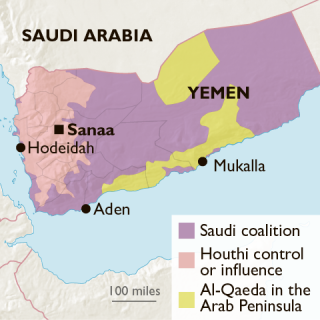
The coalition attackers have taken a sensible approach to conquering Hodeidah, coming from the south along the coastal plain, where air and armor are at their most effective. There’s talk that this strategy was pushed by the UAE, which has bought some highly-placed foreign officers (including a US Lt. Col. who somehow insists he’s not “in” the UAE military, though he wears the uniform and draws God-knows-what insane salary from it) — and plenty of mercenaries, from places as far afield as Sudan (plenty of unemployed ex-Janjaweed throat-slitters looking for work these days) and Colombia, where there’s also a surplus of experienced killers.
The Saudis, who’ve been a disaster militarily from the start of this war, stalled out along the mountainous northern border and are now just trying to stop Shia technicals from overrunning any more Saudi towns along the border. So this advance toward Hodeidah from the south not only means the death of many inland civilians, it also shows the fracture-lines within the Saudi/UAE alliance running the invasion, suggesting that down the line a few months, even more Yemeniswill die as factions backed by the UAE fight others sponsored by Riyadh over who controls the conquered territory (think Saruman’s vs Sauron’s Orcs).
When the Shia fighters pull out — or even if they stay and make a last stand in the rubble of Hodeidah — the blockade will be airtight. From then on, it’s just a matter of waiting for the blockaded population to die off in such numbers that they lose the will to fight.
It happens pretty quickly. You, a Shia fighter, might be willing to die fighting the invaders, but you’re less likely to be willing to watch your children die. You’ll give up eventually, and the “invaders” who failed on the battlefield but won by blockade will roll triumphantly into your towns as if they were brave warriors.
It’s happened before. It’s how the Nigerian Army crushed the Igbo in Biafra in the 1960s. The Biafrans won on the battlefield, but the Nigerian Army was as well-connected, world-wide, as it was cowardly and corrupt. So it laid out big money to its foreign friends and got a very cooperative silence while it starved Biafra to death. That huge international silence had a lot to do with oil and money, just as this one does. When oil, money, and a huge international alliance all line up with the people starving out a troublesome minority, you can expect a complete media blackout on news about those who are dying.
And you’re living through one of those guilty silences right now. Very few journalists have shown any interest in reporting the suffering imposed by the blockade. One of the few to try is RWN guest Bethan McKernan, who just published the only story I can find in English about how losing Hodeidah will cause massive death among the Shia.
All the other media reports I’ve found on Hodeidah are so wildly pro-Saudi they read like parody. Here’s one example from the Saudi mouthpiece Arab News:
“…the failure of negotiations compels [the Saudi-led coalition] to enforce this military solution that will cut off resources from the Houthis once and for all, ultimately shifting the balance of the war and ending the suffering. It is not just a military objective, but a moral imperative.”
Did you catch that? Tightening the blockade by capturing Hodeidah is a “moral imperative.” And that was the English-language version, the soft sell aimed at foreigners. (Arab News is aimed at Anglo expats with money living in KSA, and routinely soft-pedals stories to push the “reformist” image of MbS and the other bin Salmans, one of whom is the boss of Arab News’s parent company.)
Other media in the Sunni world had a more openly bloodthirsty, gung-ho tilt. After all, it was only a decade ago that Bandar, one of the most powerful Saud princes, warned that the Shia had provoked the Ummah’s Sunni majority to the limit, and would soon meet their doom:
“Prince Bandar bin Sultan, once the powerful Saudi ambassador in Washington and head of Saudi intelligence…had a revealing and ominous conversation with the head of the British Secret Intelligence Service, MI6, Sir Richard Dearlove. Prince Bandar told him: ‘The time is not far off in the Middle East, Richard, when it will be literally “God help the Shia”. More than a billion Sunnis have simply had enough of them.’”
Another Saudi mouthpiece journal, Asharq Awsat, published in London but funded from Riyadh (and run by yet another bin Salman brother) gloated much more openly:
“The Saudi-led coalition and the legitimate forces will be able to tighten the siege on the coup militias and close the last important port it controls after the liberation of Hodeidah governorate and its strategic harbor.”
Asharq Awsat apparently didn’t get the PR memo that the conquest of Hodeidah should be spun as a way to open up humanitarian aid. No, they’re saying the inconvenient truth of the operation, that its goal is to “tighten the siege…and close the last important port…” supplying the Shia provinces of the interior.

So the situation is lining up very nicely, militarily, for the UAE, Saudi, and their friends in D.C. and London. All you need to tighten the noose at this point in a campaign of extermination by famine/blockade is the silent collusion of world media.
And Lord, how happy the Anglo media have been to supply that last necessary element! Compare this silence to alleged starvation stories from Sunni regions of Syria.
If there was even a rumor that Sunni Syrians might be going hungry, every mainstream media outlet was all over the story. If their CIA-funded shills from the White Helmets made ridiculous claims of massacres and giant famines, later disproved, you could count on everyone from BBC to CNN to blast them over every TV in the Anglosphere.
But the hundreds of thousands of verified, real famine and epidemic cases in Yemen get very little coverage. There’s nothing subtle about why not. The Syrian Sunni jihadis were de facto allies of the US/UK/Saudi/Israel/UAE bloc. So their suffering needed to be amplified. The Shia Yemenis can be slandered with one word: “Iran.” Anything touched by Iran, for Anglo media, is inherently evil, and anything done to those so tainted needs no further justification. The “Houthi,” i.e. the Shia of NW Yemen, are allegedly puppets or proxies for Iran, the Shia Mister Big of journalistic imagination, and therefore legitimate targets for even the nastiest war of extermination (such as by hunger and disease.)
Just by the bye, the Iranian connection is mostly nonsense. The Shia of NW Yemen have been fighting against Sunni imperialists since the Ottomans tried to take their mountain villages centuries ago. They had no Iranian help then, and get very little now. The Sunni forces sent against them have always been the true foreign interlopers, featuring everything from Albanians to Egyptian contingents. But that kind of influence is just a normal fact about the world, to Anglosphere reporters, whereas even the faintest hint of Iranian aid is as horrifying as those globs of Alien goo on the landing craft of Ripley’s Nostromo.
The truth is that the mountain Shia of NW Yemen are eminently killable precisely because they DON’T have influential friends abroad. An inland population, very poor, isolated, facing a very rich and well-connected genocidal enemy — that’s the situation here, and it’s perfect for a successful extermination campaign.
As we see every day, via the non-coverage of this huge story by everyone (except the Cockburns, Bethan, and a few other brave outliers). There’ll be a time when the artificial famine in Yemen takes its place with other, similar horrors, like that in Ireland in the 1840s, Ukraine in the 1930s, and Bengal in the 1940s. And when revisionist scholars get around to counting the dead in this latest atrocity, they’ll note that there was a deadly silence from media outlets that should have known better—and DID know better, truth be told.
When Alfred Lord Tennyson, the adored Poet Laureate of Britain, was invited on a tour of Ireland at the very worst moment of the artificial famine there, he laid down strict conditions: he was to be provided with a coach with window shades that could be pulled down so as to shut out any view of “Irish distress” on the roads he traveled, and his hosts at every manor house were to instruct other guests to refrain from any mention whatsoever of this “distress”.
It’s what you see with most such famines. The loathing for the targeted minority long precedes their extermination. Once that loathing has been vented without blowback from world media, the genocidaires grow bolder, and begin to think practicalities. How and when, not “whether” to take out the troublemakers.
They don’t need, or even want, too much backing from media. All they ask is silence, distraction, anything other than the genocide itself. And they have the money and moral influence to enforce it (yes, weird as it sounds, money and power do strike most people as possessing moral force in their own right). With those advantages, and a liberal dispensing of cash to publishers, think tanks, and lobbyists, a lethal silence descends on those who are dying.
This is the last, most important element of the Ireland/Biafra/Bengal/Yemen strategy: a collusive silence from the media. Sure, it’ll be noted decades later. Books and articles will be devoted to explaining or justifying it (mostly “justifying” because powerful states tend to stay powerful, and don’t want their grandfathers’ crimes exposed).
And there’ll be a whole new set of career opportunities, for the grandkids of the journalists who are blocking the Yemen horror from their consciousness right now, in publishing scholarly articles on the complex quandaries that stopped their ancestors from seeing or smelling the corpses — when really (as I discovered when I once tried to research literary reactions to the Irish Famine) it was simple swinishness, generation after generation.
This article originally appeared as Radio War Nerd Newsletter #71, for subscribers to Radio War Nerd on Patreon. Subscribe today!

 The Fulda Gap, a mythical realm of the NATO Era.
The Fulda Gap, a mythical realm of the NATO Era.
 Peanuts 1954. This was totally first-phase dreaming, not at all like Reagan-era dreaming.
Peanuts 1954. This was totally first-phase dreaming, not at all like Reagan-era dreaming. Brezhnev: “Just let me die in peace, OK?”
Brezhnev: “Just let me die in peace, OK?” A still from Akira (1988), in which you get not one but two nuclear annihilations, both beautiful. It’s always fun when 21st c. academics go “Heeeey, there’s jouissance going on with those mushroom clouds!” As my compatriots in Cold-War Pleasant Hill were wont to say, “No shit, Sherlock Ph.D.!”
A still from Akira (1988), in which you get not one but two nuclear annihilations, both beautiful. It’s always fun when 21st c. academics go “Heeeey, there’s jouissance going on with those mushroom clouds!” As my compatriots in Cold-War Pleasant Hill were wont to say, “No shit, Sherlock Ph.D.!” The MiG-25, NATO codename “Foxbat” though it turned out to be more of a stripped-down 1970s muscle car.
The MiG-25, NATO codename “Foxbat” though it turned out to be more of a stripped-down 1970s muscle car. The F-15 Eagle: Always outnumbered in our dreams
The F-15 Eagle: Always outnumbered in our dreams































